Hexagramme 3 du Yi Jing
L'hexagramme : 3
Un hexagramme est une combinaison de six traits yin et yang.

3 - THE KUN HEXAGRAM
Kun (indicates that in the case which it presupposes) there will be great progress and success, and the advantage will come from being correct and firm. (But) any movement in advance should not be (lightly) undertaken. There will be advantage in appointing feudal princes.
Bing DeepL Google Yandex3 - Resolving difficulties
Time will need to be spent. Seek assistance and clarify the situation by identifying the problems. The others will be of great help in finding a solution.
Bing DeepL Google Yandex3 - Resolving difficulties
Time will need to be spent. Seek assistance and clarify the situation by identifying the problems. The others will be of great help in finding a solution.
Bing DeepL Google Yandex3 - T’un, la difficulté initiale
T’un et tchun : A. 1. Bourgeon, pousse ; 2. Croissance, activité ; 3. Grandir, avancer. — B. Difficultés, arrêté dans son avancement, échec.
Texte
C’est le commencement se développant, mais non affermi, achevé ; arrêté au contraire. Par l’activité, le succès s’établit heureusement en tout ce qu’on peut faire.
Symbolisme
Le tonnerre sous les nuages, entravé par eux, figure les difficultés. Le sage arrange les choses selon les exigences de celles-ci.
Commentaire
(Les deux premiers koua ont représenté séparément les deux principes.) Ici commencent leur mélange et leurs difficultés. C’est l’activité dans ces difficultés qui mène au grand succès. Quand le Ciel envoie (un temps de) troubles et (de) ténèbres, il est bon d’établir des chefs féodaux et de ne point se livrer à la sécurité et au repos. (Ceci semble ajouté par Wuh-Wang ou Tchéou-Kong pour justifier leur conduite. Wuh-Wang créa plus de cent fiefs.)
Note. Cette section se rapporte presque tout entière à tchun « difficultés entravant l’avancement, la réussite » ; 1, 2, 3, 4, 6 s’y réfèrent ; § 5 semble se rapporter aux deux mots : t’un et tchun. L’ordre originaire des phrases a été troublé ici : § 6 doit suivre 2a, et 4, 2b... ; § 6 ne semble être qu’une interpolation destinée à compléter le nombre 6. Le § 4 semble être dans le même sens. Le § 3 indique la conduite à tenir dans une difficulté imprévue.
3 - Remédier aux difficultés
Il faudra consacrer du temps. Rechercher de l'assistance et clarifier la situation en identifiant les problèmes. Les autres seront d'un grand secours dans la recherche d'une solution.
Bing DeepL Google Yandex3 - Megoldás
Időt kell rá fordítani. Segítséget kell kérni és tisztázni a helyzetet a problémák azonosításával.
Bing DeepL Google YandexLes trigrammes
Les trigrammes sont des combinaisons de trois traits yin et yang. Dans l'hexagramme, les trois traits du dessous constituent le trigramme inférieur et représentent la situation intérieure. Les trois lignes du haut constituent le trigramme supérieur et représentent la situation extérieure.
Trigramme supérieur : L'eau

Trigramme inférieur : Le tonnerre

Commentaires des traits
The lines represent the evolution of the hexagram, from the bottom (young) to the top (old).

3.1 (3 > 8) - THE KUN HEXAGRAM
The first line, undivided, shows the difficulty (its subject has) in advancing. It will be advantageous for him to abide correct and firm; advantageous (also) to be made a feudal ruler.
Bing DeepL Google Yandex3.1 (3 > 8) - Resolving difficulties
When others ask for help, if one accepts despite the constraints then one sets an example.
Bing DeepL Google Yandex3.1 (3 > 8) - Resolving difficulties
When others ask for help, if one accepts despite the constraints then one sets an example.
Bing DeepL Google Yandex3.1 (3 > 8) - T’un, la difficulté initiale
T’un et tchun : A. 1. Bourgeon, pousse ; 2. Croissance, activité ; 3. Grandir, avancer. — B. Difficultés, arrêté dans son avancement, échec.
Pour s’établir solidement, il faut se maintenir en fermeté et droiture. (Pour maintenir le royaume), il est bon de constituer des chefs féodaux. Bien qu’on ait des difficultés, la volonté doit toujours s’attacher au devoir. Si, bien qu’élevé, on condescend aux besoins des petits, on s’attachera fortement le peuple.
Bing DeepL Google Yandex3.1 (3 > 8) - Remédier aux difficultés
Quand les autres demandent de l'aide, si l'on accepte malgré les contraintes alors on donne un exemple.
Bing DeepL Google Yandex3.1 (3 > 8) - Megoldás
Példamutató ha valaki mások segítségére siet a nehézségek ellenére.
Bing DeepL Google Yandex
3.2 (3 > 60) - THE KUN HEXAGRAM
The second line, divided, shows (its subject) distressed and obliged to return; (even) the horses of her chariot (also) seem to be retreating. (But) not by a spoiler (is she assailed), but by one who seeks her to be his wife. The young lady maintains her firm correctness, and declines a union. After ten years she will be united, and have children.
Bing DeepL Google Yandex3.2 (3 > 60) - Resolving difficulties
One must establish a trusting relationship before others accept.
Bing DeepL Google Yandex3.2 (3 > 60) - Resolving difficulties
One must establish a relationship of trust before others accept.
Bing DeepL Google Yandex3.2 (3 > 60) - T’un, la difficulté initiale
T’un et tchun : A. 1. Bourgeon, pousse ; 2. Croissance, activité ; 3. Grandir, avancer. — B. Difficultés, arrêté dans son avancement, échec.
2a. Tchun est comme arrêté par les difficultés, comme un cavalier dont le cheval veut reculer (ou : un cheval monté qui veut...).
2b. C’est comme la jeune fille qui veut épouser un brigand ravisseur, elle doit rester inébranlable et attendre (plutôt) dix ans. (Malgré cela), elle pourra alors se marier et être mère. (Il est ici question de difficultés.)
Un équipage solide, l’enfantement après dix ans indique le retour à la prospérité, à l’avancement.
3.2 (3 > 60) - Remédier aux difficultés
On doit établir une relation de confiance avant que les autres n'acceptent.
Bing DeepL Google Yandex3.2 (3 > 60) - Megoldás
Megbízható kapcsolatokat kell kialakítania mielőtt mások elfogadnák.
Bing DeepL Google Yandex
3.3 (3 > 63) - THE KUN HEXAGRAM
The third line, divided, shows one following the deer without (the guidance of) the forester, and only finding himself in the midst of the forest. The superior man, acquainted with the secret risks, thinks it better to give up the chase. If he went forward, he would regret it.
Bing DeepL Google Yandex3.3 (3 > 63) - Resolving difficulties
Venturing alone into unfamiliar territory. One should seek a guide or turn back.
Bing DeepL Google Yandex3.3 (3 > 63) - Resolving difficulties
Venturing alone into unfamiliar territory. One should seek a guide or turn back.
Bing DeepL Google Yandex3.3 (3 > 63) - T’un, la difficulté initiale
T’un et tchun : A. 1. Bourgeon, pousse ; 2. Croissance, activité ; 3. Grandir, avancer. — B. Difficultés, arrêté dans son avancement, échec.
Lorsque le gibier poursuivi s’enfonce inopinément dans une forêt profonde, le sage aime mieux l’abandonner que de s’exposer au danger. S’il l’y poursuit, il aura lieu de s’en repentir.
Il sera réduit à l’extrémité.
3.3 (3 > 63) - Remédier aux difficultés
Partir seul en terrain inconnu. Il vaut mieux chercher un guide ou rebrousser chemin.
Bing DeepL Google Yandex3.3 (3 > 63) - Megoldás
Magányosan halad ismeretlen terepen. Vezetőt kell keresnie vagy visszafordulnia.
Bing DeepL Google Yandex
3.4 (3 > 17) - THE KUN HEXAGRAM
The fourth line, divided, shows (its subject as a lady), the horses of whose chariot appear in retreat. She seeks, however, (the help of) him who seeks her to be his wife. Advance will be fortunate; all will turn out advantageously.
Bing DeepL Google Yandex3.4 (3 > 17) - Knowing how to behave correctly
One will get help if they wait until others send an invitation.
Bing DeepL Google Yandex3.4 (3 > 17) - Knowing how to behave correctly
One will get help if they wait until others send an invitation.
Bing DeepL Google Yandex3.4 (3 > 17) - T’un, la difficulté initiale
T’un et tchun : A. 1. Bourgeon, pousse ; 2. Croissance, activité ; 3. Grandir, avancer. — B. Difficultés, arrêté dans son avancement, échec.
Si elle est demandée en mariage selon les rites, qu’elle y aille et ce sera bien. Cela lui sera avantageux.
Il en est de même de l’équipage arrêté qui reprend sa course.
3.4 (3 > 17) - Savoir se tenir correctement
On obtiendra de l'aide si l'on attend que les autres envoient une invitation.
Bing DeepL Google Yandex
3.5 (3 > 24) - THE KUN HEXAGRAM
The fifth line, undivided, shows the difficulties in the way of (its subject's) dispensing the rich favours that might be expected from him. With firmness and correctness there will be good fortune in small things; (even) with them in great things there will be evil.
Bing DeepL Google Yandex3.5 (3 > 24) - Questioning the commitment of others
One wants to know before deciding.
Bing DeepL Google Yandex3.5 (3 > 24) - Questioning the commitment of others
One wants to know before deciding.
Bing DeepL Google Yandex3.5 (3 > 24) - T’un, la difficulté initiale
T’un et tchun : A. 1. Bourgeon, pousse ; 2. Croissance, activité ; 3. Grandir, avancer. — B. Difficultés, arrêté dans son avancement, échec.
Dans le développement de la sève des bourgeons, si elle se répand modérément, la croissance sera heureuse ; si elle se répand trop, le croissance sera empêchée.
Il en est ainsi si elle se répand avant d’être suffisamment riche et forte.
Obstacle au développement : s’il est petit, l’issue peut être heureuse ; s’il est grand, fin malheureuse.
3.5 (3 > 24) - Remettre en question l'engagement des autres
On veut savoir avant de décider.
Bing DeepL Google Yandex
3.6 (3 > 42) - THE KUN HEXAGRAM
The topmost line, divided, shows (its subject) with the horses of his chariot obliged to retreat, and weeping tears of blood in streams.
Bing DeepL Google Yandex3.6 (3 > 42) - Resolving difficulties
One commits themself alone because others don't want to get involved without proofs. So, one pretends to be disappointed so that they understand that they are no longer welcome.
Bing DeepL Google Yandex3.6 (3 > 42) - Resolving difficulties
One commits themself alone because others don't want to get involved without proofs. So, one pretends to be disappointed so that they understand that they are no longer welcome.
Bing DeepL Google Yandex3.6 (3 > 42) - T’un, la difficulté initiale
T’un et tchun : A. 1. Bourgeon, pousse ; 2. Croissance, activité ; 3. Grandir, avancer. — B. Difficultés, arrêté dans son avancement, échec.
L’avancement, arrêté comme un cheval monté qui recule, fait répandre des larmes amères et abondantes.
Bing DeepL Google Yandex3.6 (3 > 42) - Remédier aux difficultés
On s'engage seul car les autres ne veulent pas s'impliquer sans preuves. Alors on fait semblant d'être déçu pour qu'ils comprennent qu'ils ne sont plus les bienvenus.
Bing DeepL Google Yandex3.6 (3 > 42) - Megoldás
Egyedül folytatja tovább mert mások biztosítékokat akarnak mielőtt támogatnák a fejlesztéseket. Tétotvázás helyett meg kell változtatnia szomszédságát hogy túlléphessen a nehézségeken.
Bing DeepL Google YandexL'hexagramme nucléaire : 23
L'hexagramme nucléaire est l'association des deux trigrammes intérieurs (traits 2,3,4 et 3,4,5). Il représente la racine, ou l'origine de la situation.

23 - THE PO HEXAGRAM
Po indicates that (in the state which it symbolizes) it will not be advantageous to make a movement in any direction whatever.
Bing DeepL Google Yandex23 - Poh, l’écroulement
Poh : opprimer, renverser, traiter durement.
Texte
Traiter durement ne réussit en rien.
Symbolisme
Montagne (pesant) sur la terre figure l’oppression. C’est aussi le grand affermissant le petit pour donner sécurité à son propre domaine. (Quand les sujets sont en sécurité, ils travaillent, restent en paix et font prospérer le domaine.)
Commentaire
Poh, renverser, abattre. Le petit (parfois) renverse le fort ; l’homme vulgaire grandit. On cède devant lui, mais on cherche à l’arrêter.
Considérant la forme du koua, le sage fait une attention particulière aux successions d’accroissement et de décroissance des êtres, de plénitude et de dépouillement (vide), — semblables aux mouvements du ciel (tels que l’hiver succédant à l’été, la nuit au jour, etc.).
23 - Lepusztulás
Hanyatlás, amit a tartalékok beosztásával lehet hátráltatni.
Bing DeepL Google YandexL'hexagramme complémentaire : 50
L'hexagramme accompagnateur qui rend la situation complète.

50 - THE TING HEXAGRAM.
Ting gives the intimation of great progress and success.
Bing DeepL Google Yandex50 - T’ing, le chaudron
T’ing : chaudron à trois pieds, vase du sacrifice, sacrifice.
Ko « vase à cuire (pour le sacrifice), symbole d’un principe heureux et d’un développement avantageux ». Les saints cuisaient les offrandes pour honorer Shang-ti et faisaient de grandes fêtes pour entretenir les saints et les sages.
Texte
Le chaudron est un symbole de principe heureux ; de développement prospère.
Symbolisme
Le feu entrant dans le bois figure « cuire ». Le sage garde sa dignité et maintient son destin céleste.
Commentaire
Les saints cuisaient leurs offrandes pour honorer Shang-ti et faisaient de grands festins pour entretenir les hommes saints et sages.
La docilité et la finesse d’ouïe, la clarté de la vue chez le faible qui progresse et s’élève, qui garde le milieu, obéit au puissant et s’accorde avec lui, tout cela donne la prospérité et le succès.
L'hexagramme miroir : 4
L'hexagramme miroir montre le mouvement dans la direction inverse. Quand un hexagramme est son propre miroir, cela peut signifier que l'hexagramme se meut dans les deux directions ou bien ne bouge pas.

4 - THE MĂNG HEXAGRAM
Măng (indicates that in the case which it presupposes) there will be progress and success. I do not (go and) seek the youthful and inexperienced, but he comes and seeks me. When he shows (the sincerity that marks) the first recourse to divination, I instruct him. If he apply a second and third time, that is troublesome; and I do not instruct the troublesome. There will be advantage in being firm and correct.
Bing DeepL Google Yandex4 - Questioning
Give pointers to the student who asks oneself questions, but delay before answering to the thoughtless questions. That way the student will rely on their judgment.
Bing DeepL Google Yandex4 - Questioning
Give pointers to the student who asks oneself questions, but delay before answering to the thoughtless questions. That way the student will rely on their judgment.
Bing DeepL Google Yandex4 - Meng, la stupidité juvénile
Meng : Intelligence non encore développée ; être non encore formé.
Texte
Pour le développement (de l’intelligence) ce n’est point au maître (à venir à nous), il n’en a pas besoin, mais au disciple inexpérimenté à aller au maître.
Quand quelqu’un consulte le sort, le devin lui en dit une première fois l’oracle ; si à une deuxième ou troisième fois, on n’est pas écouté, on ne l’annonce plus, on n’enseigne plus. Interpolation.
Symbolisme
Trigramme supérieur : montagne ; inférieur : précipice ; fermeté devant le danger.
En haut : montagne ; en bas : source jaillissante.
Le sage agit avec fermeté courageuse et développe la vertu.
Commentaire
L’ignorant progresse quand on le fait avancer en temps opportun ; l’entretenir et rendre bon est l’office du sage.
4 - Interroger
Donner des repères à l'élève qui s'interroge, mais temporiser avant de répondre aux questions irréfléchies. Ainsi l'élève se fiera à son jugement.
Bing DeepL Google Yandex4 - Tanácskérés
Útmutatás a kérdezni tudó tanulónak, de várni mielőtt válaszolna a meggondolatlan kérdésekre. Ezen az úton a tanuló megbízhat az ítéleteiben.
Bing DeepL Google YandexMutations

3 - THE KUN HEXAGRAM
Kun (indicates that in the case which it presupposes) there will be great progress and success, and the advantage will come from being correct and firm. (But) any movement in advance should not be (lightly) undertaken. There will be advantage in appointing feudal princes.
Bing DeepL Google Yandex3 - Resolving difficulties
Time will need to be spent. Seek assistance and clarify the situation by identifying the problems. The others will be of great help in finding a solution.
Bing DeepL Google Yandex3 - Resolving difficulties
Time will need to be spent. Seek assistance and clarify the situation by identifying the problems. The others will be of great help in finding a solution.
Bing DeepL Google Yandex3 - T’un, la difficulté initiale
T’un et tchun : A. 1. Bourgeon, pousse ; 2. Croissance, activité ; 3. Grandir, avancer. — B. Difficultés, arrêté dans son avancement, échec.
Texte
C’est le commencement se développant, mais non affermi, achevé ; arrêté au contraire. Par l’activité, le succès s’établit heureusement en tout ce qu’on peut faire.
Symbolisme
Le tonnerre sous les nuages, entravé par eux, figure les difficultés. Le sage arrange les choses selon les exigences de celles-ci.
Commentaire
(Les deux premiers koua ont représenté séparément les deux principes.) Ici commencent leur mélange et leurs difficultés. C’est l’activité dans ces difficultés qui mène au grand succès. Quand le Ciel envoie (un temps de) troubles et (de) ténèbres, il est bon d’établir des chefs féodaux et de ne point se livrer à la sécurité et au repos. (Ceci semble ajouté par Wuh-Wang ou Tchéou-Kong pour justifier leur conduite. Wuh-Wang créa plus de cent fiefs.)
Note. Cette section se rapporte presque tout entière à tchun « difficultés entravant l’avancement, la réussite » ; 1, 2, 3, 4, 6 s’y réfèrent ; § 5 semble se rapporter aux deux mots : t’un et tchun. L’ordre originaire des phrases a été troublé ici : § 6 doit suivre 2a, et 4, 2b... ; § 6 ne semble être qu’une interpolation destinée à compléter le nombre 6. Le § 4 semble être dans le même sens. Le § 3 indique la conduite à tenir dans une difficulté imprévue.
3 - Remédier aux difficultés
Il faudra consacrer du temps. Rechercher de l'assistance et clarifier la situation en identifiant les problèmes. Les autres seront d'un grand secours dans la recherche d'une solution.
Bing DeepL Google Yandex3 - Megoldás
Időt kell rá fordítani. Segítséget kell kérni és tisztázni a helyzetet a problémák azonosításával.
Bing DeepL Google Yandex
3.1 (3 > 8) - THE KUN HEXAGRAM
The first line, undivided, shows the difficulty (its subject has) in advancing. It will be advantageous for him to abide correct and firm; advantageous (also) to be made a feudal ruler.
Bing DeepL Google Yandex3.1 (3 > 8) - Resolving difficulties
When others ask for help, if one accepts despite the constraints then one sets an example.
Bing DeepL Google Yandex3.1 (3 > 8) - Resolving difficulties
When others ask for help, if one accepts despite the constraints then one sets an example.
Bing DeepL Google Yandex3.1 (3 > 8) - T’un, la difficulté initiale
T’un et tchun : A. 1. Bourgeon, pousse ; 2. Croissance, activité ; 3. Grandir, avancer. — B. Difficultés, arrêté dans son avancement, échec.
Pour s’établir solidement, il faut se maintenir en fermeté et droiture. (Pour maintenir le royaume), il est bon de constituer des chefs féodaux. Bien qu’on ait des difficultés, la volonté doit toujours s’attacher au devoir. Si, bien qu’élevé, on condescend aux besoins des petits, on s’attachera fortement le peuple.
Bing DeepL Google Yandex3.1 (3 > 8) - Remédier aux difficultés
Quand les autres demandent de l'aide, si l'on accepte malgré les contraintes alors on donne un exemple.
Bing DeepL Google Yandex3.1 (3 > 8) - Megoldás
Példamutató ha valaki mások segítségére siet a nehézségek ellenére.
Bing DeepL Google Yandex
3.2 (3 > 60) - THE KUN HEXAGRAM
The second line, divided, shows (its subject) distressed and obliged to return; (even) the horses of her chariot (also) seem to be retreating. (But) not by a spoiler (is she assailed), but by one who seeks her to be his wife. The young lady maintains her firm correctness, and declines a union. After ten years she will be united, and have children.
Bing DeepL Google Yandex3.2 (3 > 60) - Resolving difficulties
One must establish a trusting relationship before others accept.
Bing DeepL Google Yandex3.2 (3 > 60) - Resolving difficulties
One must establish a relationship of trust before others accept.
Bing DeepL Google Yandex3.2 (3 > 60) - T’un, la difficulté initiale
T’un et tchun : A. 1. Bourgeon, pousse ; 2. Croissance, activité ; 3. Grandir, avancer. — B. Difficultés, arrêté dans son avancement, échec.
2a. Tchun est comme arrêté par les difficultés, comme un cavalier dont le cheval veut reculer (ou : un cheval monté qui veut...).
2b. C’est comme la jeune fille qui veut épouser un brigand ravisseur, elle doit rester inébranlable et attendre (plutôt) dix ans. (Malgré cela), elle pourra alors se marier et être mère. (Il est ici question de difficultés.)
Un équipage solide, l’enfantement après dix ans indique le retour à la prospérité, à l’avancement.
3.2 (3 > 60) - Remédier aux difficultés
On doit établir une relation de confiance avant que les autres n'acceptent.
Bing DeepL Google Yandex3.2 (3 > 60) - Megoldás
Megbízható kapcsolatokat kell kialakítania mielőtt mások elfogadnák.
Bing DeepL Google Yandex
3.1.2 (3 > 29) - THE KUN HEXAGRAM
- 1. The first line, undivided, shows the difficulty (its subject has) in advancing. It will be advantageous for him to abide correct and firm; advantageous (also) to be made a feudal ruler.
- 2. The second line, divided, shows (its subject) distressed and obliged to return; (even) the horses of her chariot (also) seem to be retreating. (But) not by a spoiler (is she assailed), but by one who seeks her to be his wife. The young lady maintains her firm correctness, and declines a union. After ten years she will be united, and have children.
3.1.2 (3 > 29) - Giving tokens of friendship
One draws on their wealth to gain the trust of others.
Bing DeepL Google Yandex3.1.2 (3 > 29) - Giving tokens of friendship
One draws on their wealth to gain the trust of others.
Bing DeepL Google Yandex3.1.2 (3 > 29) - T’un, la difficulté initiale
T’un et tchun : A. 1. Bourgeon, pousse ; 2. Croissance, activité ; 3. Grandir, avancer. — B. Difficultés, arrêté dans son avancement, échec.
- 1. Pour s’établir solidement, il faut se maintenir en fermeté et droiture. (Pour maintenir le royaume), il est bon de constituer des chefs féodaux. Bien qu’on ait des difficultés, la volonté doit toujours s’attacher au devoir. Si, bien qu’élevé, on condescend aux besoins des petits, on s’attachera fortement le peuple.
-
2. 2a. Tchun est comme arrêté par les difficultés, comme un cavalier dont le cheval veut reculer (ou : un cheval monté qui veut...).
2b. C’est comme la jeune fille qui veut épouser un brigand ravisseur, elle doit rester inébranlable et attendre (plutôt) dix ans. (Malgré cela), elle pourra alors se marier et être mère. (Il est ici question de difficultés.)
Un équipage solide, l’enfantement après dix ans indique le retour à la prospérité, à l’avancement.
3.1.2 (3 > 29) - Donner des gages d'amitié
On puise dans ses richesses pour gagner la confiance des autres.
Bing DeepL Google Yandex3.1.2 (3 > 29) - Megoldás
- 1. Példamutató ha valaki mások segítségére siet a nehézségek ellenére.
- 2. Megbízható kapcsolatokat kell kialakítania mielőtt mások elfogadnák.

3.3 (3 > 63) - THE KUN HEXAGRAM
The third line, divided, shows one following the deer without (the guidance of) the forester, and only finding himself in the midst of the forest. The superior man, acquainted with the secret risks, thinks it better to give up the chase. If he went forward, he would regret it.
Bing DeepL Google Yandex3.3 (3 > 63) - Resolving difficulties
Venturing alone into unfamiliar territory. One should seek a guide or turn back.
Bing DeepL Google Yandex3.3 (3 > 63) - Resolving difficulties
Venturing alone into unfamiliar territory. One should seek a guide or turn back.
Bing DeepL Google Yandex3.3 (3 > 63) - T’un, la difficulté initiale
T’un et tchun : A. 1. Bourgeon, pousse ; 2. Croissance, activité ; 3. Grandir, avancer. — B. Difficultés, arrêté dans son avancement, échec.
Lorsque le gibier poursuivi s’enfonce inopinément dans une forêt profonde, le sage aime mieux l’abandonner que de s’exposer au danger. S’il l’y poursuit, il aura lieu de s’en repentir.
Il sera réduit à l’extrémité.
3.3 (3 > 63) - Remédier aux difficultés
Partir seul en terrain inconnu. Il vaut mieux chercher un guide ou rebrousser chemin.
Bing DeepL Google Yandex3.3 (3 > 63) - Megoldás
Magányosan halad ismeretlen terepen. Vezetőt kell keresnie vagy visszafordulnia.
Bing DeepL Google Yandex
3.1.3 (3 > 39) - THE KUN HEXAGRAM
- 1. The first line, undivided, shows the difficulty (its subject has) in advancing. It will be advantageous for him to abide correct and firm; advantageous (also) to be made a feudal ruler.
- 3. The third line, divided, shows one following the deer without (the guidance of) the forester, and only finding himself in the midst of the forest. The superior man, acquainted with the secret risks, thinks it better to give up the chase. If he went forward, he would regret it.
3.1.3 (3 > 39) - Getting out of the routine
One can leave the beaten tracks to take side ways.
Bing DeepL Google Yandex3.1.3 (3 > 39) - Getting out of the routine
One can leave the beaten tracks to take side ways.
Bing DeepL Google Yandex3.1.3 (3 > 39) - T’un, la difficulté initiale
T’un et tchun : A. 1. Bourgeon, pousse ; 2. Croissance, activité ; 3. Grandir, avancer. — B. Difficultés, arrêté dans son avancement, échec.
- 1. Pour s’établir solidement, il faut se maintenir en fermeté et droiture. (Pour maintenir le royaume), il est bon de constituer des chefs féodaux. Bien qu’on ait des difficultés, la volonté doit toujours s’attacher au devoir. Si, bien qu’élevé, on condescend aux besoins des petits, on s’attachera fortement le peuple.
-
3. Lorsque le gibier poursuivi s’enfonce inopinément dans une forêt profonde, le sage aime mieux l’abandonner que de s’exposer au danger. S’il l’y poursuit, il aura lieu de s’en repentir.
Il sera réduit à l’extrémité.
3.1.3 (3 > 39) - Sortir de la routine
On peut quitter les sentiers battus pour prendre des chemins de traverse.
Bing DeepL Google Yandex3.1.3 (3 > 39) - Megoldás
- 1. Példamutató ha valaki mások segítségére siet a nehézségek ellenére.
- 3. Magányosan halad ismeretlen terepen. Vezetőt kell keresnie vagy visszafordulnia.

3.2.3 (3 > 5) - THE KUN HEXAGRAM
- 2. The second line, divided, shows (its subject) distressed and obliged to return; (even) the horses of her chariot (also) seem to be retreating. (But) not by a spoiler (is she assailed), but by one who seeks her to be his wife. The young lady maintains her firm correctness, and declines a union. After ten years she will be united, and have children.
- 3. The third line, divided, shows one following the deer without (the guidance of) the forester, and only finding himself in the midst of the forest. The superior man, acquainted with the secret risks, thinks it better to give up the chase. If he went forward, he would regret it.
3.2.3 (3 > 5) - Resolving difficulties
One starts by gaining confidence then is caught up in difficulties.
Bing DeepL Google Yandex3.2.3 (3 > 5) - Resolving difficulties
One starts by gaining confidence then is caught up in difficulties.
Bing DeepL Google Yandex3.2.3 (3 > 5) - T’un, la difficulté initiale
T’un et tchun : A. 1. Bourgeon, pousse ; 2. Croissance, activité ; 3. Grandir, avancer. — B. Difficultés, arrêté dans son avancement, échec.
-
2. 2a. Tchun est comme arrêté par les difficultés, comme un cavalier dont le cheval veut reculer (ou : un cheval monté qui veut...).
2b. C’est comme la jeune fille qui veut épouser un brigand ravisseur, elle doit rester inébranlable et attendre (plutôt) dix ans. (Malgré cela), elle pourra alors se marier et être mère. (Il est ici question de difficultés.)
Un équipage solide, l’enfantement après dix ans indique le retour à la prospérité, à l’avancement. -
3. Lorsque le gibier poursuivi s’enfonce inopinément dans une forêt profonde, le sage aime mieux l’abandonner que de s’exposer au danger. S’il l’y poursuit, il aura lieu de s’en repentir.
Il sera réduit à l’extrémité.
3.2.3 (3 > 5) - Remédier aux difficultés
On commence par prendre de l'aisance puis on est rattrapé par les difficultés.
Bing DeepL Google Yandex3.2.3 (3 > 5) - Megoldás
- 2. Megbízható kapcsolatokat kell kialakítania mielőtt mások elfogadnák.
- 3. Magányosan halad ismeretlen terepen. Vezetőt kell keresnie vagy visszafordulnia.

3.1.2.3 (3 > 48) - THE KUN HEXAGRAM
- 1. The first line, undivided, shows the difficulty (its subject has) in advancing. It will be advantageous for him to abide correct and firm; advantageous (also) to be made a feudal ruler.
- 2. The second line, divided, shows (its subject) distressed and obliged to return; (even) the horses of her chariot (also) seem to be retreating. (But) not by a spoiler (is she assailed), but by one who seeks her to be his wife. The young lady maintains her firm correctness, and declines a union. After ten years she will be united, and have children.
- 3. The third line, divided, shows one following the deer without (the guidance of) the forester, and only finding himself in the midst of the forest. The superior man, acquainted with the secret risks, thinks it better to give up the chase. If he went forward, he would regret it.
3.1.2.3 (3 > 48) - Controlling insubordination
One thinks having enough relationships to be able to contain the progress of the will.
Bing DeepL Google Yandex3.1.2.3 (3 > 48) - Controlling insubordination
One thinks having enough relationships to be able to contain the progress of the will.
Bing DeepL Google Yandex3.1.2.3 (3 > 48) - T’un, la difficulté initiale
T’un et tchun : A. 1. Bourgeon, pousse ; 2. Croissance, activité ; 3. Grandir, avancer. — B. Difficultés, arrêté dans son avancement, échec.
- 1. Pour s’établir solidement, il faut se maintenir en fermeté et droiture. (Pour maintenir le royaume), il est bon de constituer des chefs féodaux. Bien qu’on ait des difficultés, la volonté doit toujours s’attacher au devoir. Si, bien qu’élevé, on condescend aux besoins des petits, on s’attachera fortement le peuple.
-
2. 2a. Tchun est comme arrêté par les difficultés, comme un cavalier dont le cheval veut reculer (ou : un cheval monté qui veut...).
2b. C’est comme la jeune fille qui veut épouser un brigand ravisseur, elle doit rester inébranlable et attendre (plutôt) dix ans. (Malgré cela), elle pourra alors se marier et être mère. (Il est ici question de difficultés.)
Un équipage solide, l’enfantement après dix ans indique le retour à la prospérité, à l’avancement. -
3. Lorsque le gibier poursuivi s’enfonce inopinément dans une forêt profonde, le sage aime mieux l’abandonner que de s’exposer au danger. S’il l’y poursuit, il aura lieu de s’en repentir.
Il sera réduit à l’extrémité.
3.1.2.3 (3 > 48) - Contrôler l'insoumission
On pense avoir suffisamment de relations pour être capable de maîtriser les progrès de la volonté.
Bing DeepL Google Yandex3.1.2.3 (3 > 48) - Megoldás
- 1. Példamutató ha valaki mások segítségére siet a nehézségek ellenére.
- 2. Megbízható kapcsolatokat kell kialakítania mielőtt mások elfogadnák.
- 3. Magányosan halad ismeretlen terepen. Vezetőt kell keresnie vagy visszafordulnia.

3.4 (3 > 17) - THE KUN HEXAGRAM
The fourth line, divided, shows (its subject as a lady), the horses of whose chariot appear in retreat. She seeks, however, (the help of) him who seeks her to be his wife. Advance will be fortunate; all will turn out advantageously.
Bing DeepL Google Yandex3.4 (3 > 17) - Knowing how to behave correctly
One will get help if they wait until others send an invitation.
Bing DeepL Google Yandex3.4 (3 > 17) - Knowing how to behave correctly
One will get help if they wait until others send an invitation.
Bing DeepL Google Yandex3.4 (3 > 17) - T’un, la difficulté initiale
T’un et tchun : A. 1. Bourgeon, pousse ; 2. Croissance, activité ; 3. Grandir, avancer. — B. Difficultés, arrêté dans son avancement, échec.
Si elle est demandée en mariage selon les rites, qu’elle y aille et ce sera bien. Cela lui sera avantageux.
Il en est de même de l’équipage arrêté qui reprend sa course.
3.4 (3 > 17) - Savoir se tenir correctement
On obtiendra de l'aide si l'on attend que les autres envoient une invitation.
Bing DeepL Google Yandex
3.1.4 (3 > 45) - THE KUN HEXAGRAM
- 1. The first line, undivided, shows the difficulty (its subject has) in advancing. It will be advantageous for him to abide correct and firm; advantageous (also) to be made a feudal ruler.
- 4. The fourth line, divided, shows (its subject as a lady), the horses of whose chariot appear in retreat. She seeks, however, (the help of) him who seeks her to be his wife. Advance will be fortunate; all will turn out advantageously.
3.1.4 (3 > 45) - Resolving difficulties
One wishes others an excellent stay among those who have received a distinction.
Bing DeepL Google Yandex3.1.4 (3 > 45) - Resolving difficulties
One wishes others an excellent stay among those who have received a distinction.
Bing DeepL Google Yandex3.1.4 (3 > 45) - T’un, la difficulté initiale
T’un et tchun : A. 1. Bourgeon, pousse ; 2. Croissance, activité ; 3. Grandir, avancer. — B. Difficultés, arrêté dans son avancement, échec.
- 1. Pour s’établir solidement, il faut se maintenir en fermeté et droiture. (Pour maintenir le royaume), il est bon de constituer des chefs féodaux. Bien qu’on ait des difficultés, la volonté doit toujours s’attacher au devoir. Si, bien qu’élevé, on condescend aux besoins des petits, on s’attachera fortement le peuple.
-
4. Si elle est demandée en mariage selon les rites, qu’elle y aille et ce sera bien. Cela lui sera avantageux.
Il en est de même de l’équipage arrêté qui reprend sa course.
3.1.4 (3 > 45) - Remédier aux difficultés
On souhaite aux autres un excellent séjour parmi ceux qui ont reçu une distinction.
Bing DeepL Google Yandex3.1.4 (3 > 45) - Megoldás
- 1. Példamutató ha valaki mások segítségére siet a nehézségek ellenére.
- 4. Segítséget kap ha kivárja a sorát.

3.2.4 (3 > 58) - THE KUN HEXAGRAM
- 2. The second line, divided, shows (its subject) distressed and obliged to return; (even) the horses of her chariot (also) seem to be retreating. (But) not by a spoiler (is she assailed), but by one who seeks her to be his wife. The young lady maintains her firm correctness, and declines a union. After ten years she will be united, and have children.
- 4. The fourth line, divided, shows (its subject as a lady), the horses of whose chariot appear in retreat. She seeks, however, (the help of) him who seeks her to be his wife. Advance will be fortunate; all will turn out advantageously.
3.2.4 (3 > 58) - Resolving difficulties
Others want one to be able to give them confidential informations.
Bing DeepL Google Yandex3.2.4 (3 > 58) - Resolving difficulties
Others want one to be able to give them confidential informations.
Bing DeepL Google Yandex3.2.4 (3 > 58) - T’un, la difficulté initiale
T’un et tchun : A. 1. Bourgeon, pousse ; 2. Croissance, activité ; 3. Grandir, avancer. — B. Difficultés, arrêté dans son avancement, échec.
-
2. 2a. Tchun est comme arrêté par les difficultés, comme un cavalier dont le cheval veut reculer (ou : un cheval monté qui veut...).
2b. C’est comme la jeune fille qui veut épouser un brigand ravisseur, elle doit rester inébranlable et attendre (plutôt) dix ans. (Malgré cela), elle pourra alors se marier et être mère. (Il est ici question de difficultés.)
Un équipage solide, l’enfantement après dix ans indique le retour à la prospérité, à l’avancement. -
4. Si elle est demandée en mariage selon les rites, qu’elle y aille et ce sera bien. Cela lui sera avantageux.
Il en est de même de l’équipage arrêté qui reprend sa course.
3.2.4 (3 > 58) - Remédier aux difficultés
Les autres veulent que l'on soit capable de leur donner des informations confidentielles.
Bing DeepL Google Yandex3.2.4 (3 > 58) - Megoldás
- 2. Megbízható kapcsolatokat kell kialakítania mielőtt mások elfogadnák.
- 4. Segítséget kap ha kivárja a sorát.

3.1.2.4 (3 > 47) - THE KUN HEXAGRAM
- 1. The first line, undivided, shows the difficulty (its subject has) in advancing. It will be advantageous for him to abide correct and firm; advantageous (also) to be made a feudal ruler.
- 2. The second line, divided, shows (its subject) distressed and obliged to return; (even) the horses of her chariot (also) seem to be retreating. (But) not by a spoiler (is she assailed), but by one who seeks her to be his wife. The young lady maintains her firm correctness, and declines a union. After ten years she will be united, and have children.
- 4. The fourth line, divided, shows (its subject as a lady), the horses of whose chariot appear in retreat. She seeks, however, (the help of) him who seeks her to be his wife. Advance will be fortunate; all will turn out advantageously.
3.1.2.4 (3 > 47) - Resolving difficulties
One acts as if someone else had taken control of their existence.
Bing DeepL Google Yandex3.1.2.4 (3 > 47) - Resolving difficulties
One acts as if someone else had taken control of their existence.
Bing DeepL Google Yandex3.1.2.4 (3 > 47) - T’un, la difficulté initiale
T’un et tchun : A. 1. Bourgeon, pousse ; 2. Croissance, activité ; 3. Grandir, avancer. — B. Difficultés, arrêté dans son avancement, échec.
- 1. Pour s’établir solidement, il faut se maintenir en fermeté et droiture. (Pour maintenir le royaume), il est bon de constituer des chefs féodaux. Bien qu’on ait des difficultés, la volonté doit toujours s’attacher au devoir. Si, bien qu’élevé, on condescend aux besoins des petits, on s’attachera fortement le peuple.
-
2. 2a. Tchun est comme arrêté par les difficultés, comme un cavalier dont le cheval veut reculer (ou : un cheval monté qui veut...).
2b. C’est comme la jeune fille qui veut épouser un brigand ravisseur, elle doit rester inébranlable et attendre (plutôt) dix ans. (Malgré cela), elle pourra alors se marier et être mère. (Il est ici question de difficultés.)
Un équipage solide, l’enfantement après dix ans indique le retour à la prospérité, à l’avancement. -
4. Si elle est demandée en mariage selon les rites, qu’elle y aille et ce sera bien. Cela lui sera avantageux.
Il en est de même de l’équipage arrêté qui reprend sa course.
3.1.2.4 (3 > 47) - Remédier aux difficultés
On fait comme si quelqu'un d'autre avait pris le contrôle de son existence.
Bing DeepL Google Yandex3.1.2.4 (3 > 47) - Megoldás
- 1. Példamutató ha valaki mások segítségére siet a nehézségek ellenére.
- 2. Megbízható kapcsolatokat kell kialakítania mielőtt mások elfogadnák.
- 4. Segítséget kap ha kivárja a sorát.

3.3.4 (3 > 49) - THE KUN HEXAGRAM
- 3. The third line, divided, shows one following the deer without (the guidance of) the forester, and only finding himself in the midst of the forest. The superior man, acquainted with the secret risks, thinks it better to give up the chase. If he went forward, he would regret it.
- 4. The fourth line, divided, shows (its subject as a lady), the horses of whose chariot appear in retreat. She seeks, however, (the help of) him who seeks her to be his wife. Advance will be fortunate; all will turn out advantageously.
3.3.4 (3 > 49) - Resolving difficulties
One can listen to the advice of the most able advisors instead of charging straight ahead without looking where they are going.
Bing DeepL Google Yandex3.3.4 (3 > 49) - Resolving difficulties
One can listen to the advice of the most able advisers instead of charging straight ahead without looking where they are going.
Bing DeepL Google Yandex3.3.4 (3 > 49) - T’un, la difficulté initiale
T’un et tchun : A. 1. Bourgeon, pousse ; 2. Croissance, activité ; 3. Grandir, avancer. — B. Difficultés, arrêté dans son avancement, échec.
-
3. Lorsque le gibier poursuivi s’enfonce inopinément dans une forêt profonde, le sage aime mieux l’abandonner que de s’exposer au danger. S’il l’y poursuit, il aura lieu de s’en repentir.
Il sera réduit à l’extrémité. -
4. Si elle est demandée en mariage selon les rites, qu’elle y aille et ce sera bien. Cela lui sera avantageux.
Il en est de même de l’équipage arrêté qui reprend sa course.
3.3.4 (3 > 49) - Remédier aux difficultés
On peut écouter les avis des conseillers les plus capables au lieu de foncer droit devant sans regarder où on va.
Bing DeepL Google Yandex3.3.4 (3 > 49) - Megoldás
- 3. Magányosan halad ismeretlen terepen. Vezetőt kell keresnie vagy visszafordulnia.
- 4. Segítséget kap ha kivárja a sorát.

3.1.3.4 (3 > 31) - THE KUN HEXAGRAM
- 1. The first line, undivided, shows the difficulty (its subject has) in advancing. It will be advantageous for him to abide correct and firm; advantageous (also) to be made a feudal ruler.
- 3. The third line, divided, shows one following the deer without (the guidance of) the forester, and only finding himself in the midst of the forest. The superior man, acquainted with the secret risks, thinks it better to give up the chase. If he went forward, he would regret it.
- 4. The fourth line, divided, shows (its subject as a lady), the horses of whose chariot appear in retreat. She seeks, however, (the help of) him who seeks her to be his wife. Advance will be fortunate; all will turn out advantageously.
3.1.3.4 (3 > 31) - Resolving difficulties
One pretends not knowing what to do when they do not have time to ponder.
Bing DeepL Google Yandex3.1.3.4 (3 > 31) - Resolving difficulties
One pretends not knowing what to do when they do not have time to ponder.
Bing DeepL Google Yandex3.1.3.4 (3 > 31) - T’un, la difficulté initiale
T’un et tchun : A. 1. Bourgeon, pousse ; 2. Croissance, activité ; 3. Grandir, avancer. — B. Difficultés, arrêté dans son avancement, échec.
- 1. Pour s’établir solidement, il faut se maintenir en fermeté et droiture. (Pour maintenir le royaume), il est bon de constituer des chefs féodaux. Bien qu’on ait des difficultés, la volonté doit toujours s’attacher au devoir. Si, bien qu’élevé, on condescend aux besoins des petits, on s’attachera fortement le peuple.
-
3. Lorsque le gibier poursuivi s’enfonce inopinément dans une forêt profonde, le sage aime mieux l’abandonner que de s’exposer au danger. S’il l’y poursuit, il aura lieu de s’en repentir.
Il sera réduit à l’extrémité. -
4. Si elle est demandée en mariage selon les rites, qu’elle y aille et ce sera bien. Cela lui sera avantageux.
Il en est de même de l’équipage arrêté qui reprend sa course.
3.1.3.4 (3 > 31) - Remédier aux difficultés
On prétend ne pas savoir quoi faire quand on n'a pas le temps de réfléchir.
Bing DeepL Google Yandex3.1.3.4 (3 > 31) - Megoldás
- 1. Példamutató ha valaki mások segítségére siet a nehézségek ellenére.
- 3. Magányosan halad ismeretlen terepen. Vezetőt kell keresnie vagy visszafordulnia.
- 4. Segítséget kap ha kivárja a sorát.

3.2.3.4 (3 > 43) - THE KUN HEXAGRAM
- 2. The second line, divided, shows (its subject) distressed and obliged to return; (even) the horses of her chariot (also) seem to be retreating. (But) not by a spoiler (is she assailed), but by one who seeks her to be his wife. The young lady maintains her firm correctness, and declines a union. After ten years she will be united, and have children.
- 3. The third line, divided, shows one following the deer without (the guidance of) the forester, and only finding himself in the midst of the forest. The superior man, acquainted with the secret risks, thinks it better to give up the chase. If he went forward, he would regret it.
- 4. The fourth line, divided, shows (its subject as a lady), the horses of whose chariot appear in retreat. She seeks, however, (the help of) him who seeks her to be his wife. Advance will be fortunate; all will turn out advantageously.
3.2.3.4 (3 > 43) - Resolving difficulties
One thought they could set the rules, but realises that they were established well in advance.
Bing DeepL Google Yandex3.2.3.4 (3 > 43) - Resolving difficulties
One thought they could set the rules, but realizes that they were established well in advance.
Bing DeepL Google Yandex3.2.3.4 (3 > 43) - T’un, la difficulté initiale
T’un et tchun : A. 1. Bourgeon, pousse ; 2. Croissance, activité ; 3. Grandir, avancer. — B. Difficultés, arrêté dans son avancement, échec.
-
2. 2a. Tchun est comme arrêté par les difficultés, comme un cavalier dont le cheval veut reculer (ou : un cheval monté qui veut...).
2b. C’est comme la jeune fille qui veut épouser un brigand ravisseur, elle doit rester inébranlable et attendre (plutôt) dix ans. (Malgré cela), elle pourra alors se marier et être mère. (Il est ici question de difficultés.)
Un équipage solide, l’enfantement après dix ans indique le retour à la prospérité, à l’avancement. -
3. Lorsque le gibier poursuivi s’enfonce inopinément dans une forêt profonde, le sage aime mieux l’abandonner que de s’exposer au danger. S’il l’y poursuit, il aura lieu de s’en repentir.
Il sera réduit à l’extrémité. -
4. Si elle est demandée en mariage selon les rites, qu’elle y aille et ce sera bien. Cela lui sera avantageux.
Il en est de même de l’équipage arrêté qui reprend sa course.
3.2.3.4 (3 > 43) - Remédier aux difficultés
On croyait être capable de fixer les règles mais on s'aperçoit que celles-ci ont été établies bien à l'avance.
Bing DeepL Google Yandex3.2.3.4 (3 > 43) - Megoldás
- 2. Megbízható kapcsolatokat kell kialakítania mielőtt mások elfogadnák.
- 3. Magányosan halad ismeretlen terepen. Vezetőt kell keresnie vagy visszafordulnia.
- 4. Segítséget kap ha kivárja a sorát.

3.1.2.3.4 (3 > 28) - THE KUN HEXAGRAM
- 1. The first line, undivided, shows the difficulty (its subject has) in advancing. It will be advantageous for him to abide correct and firm; advantageous (also) to be made a feudal ruler.
- 2. The second line, divided, shows (its subject) distressed and obliged to return; (even) the horses of her chariot (also) seem to be retreating. (But) not by a spoiler (is she assailed), but by one who seeks her to be his wife. The young lady maintains her firm correctness, and declines a union. After ten years she will be united, and have children.
- 3. The third line, divided, shows one following the deer without (the guidance of) the forester, and only finding himself in the midst of the forest. The superior man, acquainted with the secret risks, thinks it better to give up the chase. If he went forward, he would regret it.
- 4. The fourth line, divided, shows (its subject as a lady), the horses of whose chariot appear in retreat. She seeks, however, (the help of) him who seeks her to be his wife. Advance will be fortunate; all will turn out advantageously.
3.1.2.3.4 (3 > 28) - Holding an important knowledge
One knows many things that others would like to learn.
Bing DeepL Google Yandex3.1.2.3.4 (3 > 28) - Holding an important knowledge
One knows many things that others would like to learn.
Bing DeepL Google Yandex3.1.2.3.4 (3 > 28) - T’un, la difficulté initiale
T’un et tchun : A. 1. Bourgeon, pousse ; 2. Croissance, activité ; 3. Grandir, avancer. — B. Difficultés, arrêté dans son avancement, échec.
- 1. Pour s’établir solidement, il faut se maintenir en fermeté et droiture. (Pour maintenir le royaume), il est bon de constituer des chefs féodaux. Bien qu’on ait des difficultés, la volonté doit toujours s’attacher au devoir. Si, bien qu’élevé, on condescend aux besoins des petits, on s’attachera fortement le peuple.
-
2. 2a. Tchun est comme arrêté par les difficultés, comme un cavalier dont le cheval veut reculer (ou : un cheval monté qui veut...).
2b. C’est comme la jeune fille qui veut épouser un brigand ravisseur, elle doit rester inébranlable et attendre (plutôt) dix ans. (Malgré cela), elle pourra alors se marier et être mère. (Il est ici question de difficultés.)
Un équipage solide, l’enfantement après dix ans indique le retour à la prospérité, à l’avancement. -
3. Lorsque le gibier poursuivi s’enfonce inopinément dans une forêt profonde, le sage aime mieux l’abandonner que de s’exposer au danger. S’il l’y poursuit, il aura lieu de s’en repentir.
Il sera réduit à l’extrémité. -
4. Si elle est demandée en mariage selon les rites, qu’elle y aille et ce sera bien. Cela lui sera avantageux.
Il en est de même de l’équipage arrêté qui reprend sa course.
3.1.2.3.4 (3 > 28) - Détenir un savoir important
On sait beaucoup de choses que les autres aimeraient apprendre.
Bing DeepL Google Yandex3.1.2.3.4 (3 > 28) - Megoldás
- 1. Példamutató ha valaki mások segítségére siet a nehézségek ellenére.
- 2. Megbízható kapcsolatokat kell kialakítania mielőtt mások elfogadnák.
- 3. Magányosan halad ismeretlen terepen. Vezetőt kell keresnie vagy visszafordulnia.
- 4. Segítséget kap ha kivárja a sorát.

3.5 (3 > 24) - THE KUN HEXAGRAM
The fifth line, undivided, shows the difficulties in the way of (its subject's) dispensing the rich favours that might be expected from him. With firmness and correctness there will be good fortune in small things; (even) with them in great things there will be evil.
Bing DeepL Google Yandex3.5 (3 > 24) - Questioning the commitment of others
One wants to know before deciding.
Bing DeepL Google Yandex3.5 (3 > 24) - Questioning the commitment of others
One wants to know before deciding.
Bing DeepL Google Yandex3.5 (3 > 24) - T’un, la difficulté initiale
T’un et tchun : A. 1. Bourgeon, pousse ; 2. Croissance, activité ; 3. Grandir, avancer. — B. Difficultés, arrêté dans son avancement, échec.
Dans le développement de la sève des bourgeons, si elle se répand modérément, la croissance sera heureuse ; si elle se répand trop, le croissance sera empêchée.
Il en est ainsi si elle se répand avant d’être suffisamment riche et forte.
Obstacle au développement : s’il est petit, l’issue peut être heureuse ; s’il est grand, fin malheureuse.
3.5 (3 > 24) - Remettre en question l'engagement des autres
On veut savoir avant de décider.
Bing DeepL Google Yandex
3.1.5 (3 > 2) - THE KUN HEXAGRAM
- 1. The first line, undivided, shows the difficulty (its subject has) in advancing. It will be advantageous for him to abide correct and firm; advantageous (also) to be made a feudal ruler.
- 5. The fifth line, undivided, shows the difficulties in the way of (its subject's) dispensing the rich favours that might be expected from him. With firmness and correctness there will be good fortune in small things; (even) with them in great things there will be evil.
3.1.5 (3 > 2) - Resolving difficulties
One hurries to set out to help those who deserve it.
Bing DeepL Google Yandex3.1.5 (3 > 2) - Resolving difficulties
One hurries to set out to help those who deserve it.
Bing DeepL Google Yandex3.1.5 (3 > 2) - T’un, la difficulté initiale
T’un et tchun : A. 1. Bourgeon, pousse ; 2. Croissance, activité ; 3. Grandir, avancer. — B. Difficultés, arrêté dans son avancement, échec.
- 1. Pour s’établir solidement, il faut se maintenir en fermeté et droiture. (Pour maintenir le royaume), il est bon de constituer des chefs féodaux. Bien qu’on ait des difficultés, la volonté doit toujours s’attacher au devoir. Si, bien qu’élevé, on condescend aux besoins des petits, on s’attachera fortement le peuple.
-
5. Dans le développement de la sève des bourgeons, si elle se répand modérément, la croissance sera heureuse ; si elle se répand trop, le croissance sera empêchée.
Il en est ainsi si elle se répand avant d’être suffisamment riche et forte.
Obstacle au développement : s’il est petit, l’issue peut être heureuse ; s’il est grand, fin malheureuse.
3.1.5 (3 > 2) - Remédier aux difficultés
On se dépêche de se mettre en route pour aider ceux qui le méritent.
Bing DeepL Google Yandex3.1.5 (3 > 2) - Megoldás
- 1. Példamutató ha valaki mások segítségére siet a nehézségek ellenére.
- 5. Tudni akar mielőtt döntene.

3.2.5 (3 > 19) - THE KUN HEXAGRAM
- 2. The second line, divided, shows (its subject) distressed and obliged to return; (even) the horses of her chariot (also) seem to be retreating. (But) not by a spoiler (is she assailed), but by one who seeks her to be his wife. The young lady maintains her firm correctness, and declines a union. After ten years she will be united, and have children.
- 5. The fifth line, undivided, shows the difficulties in the way of (its subject's) dispensing the rich favours that might be expected from him. With firmness and correctness there will be good fortune in small things; (even) with them in great things there will be evil.
3.2.5 (3 > 19) - Resolving difficulties
One will make the elders a reference for the future.
Bing DeepL Google Yandex3.2.5 (3 > 19) - Resolving difficulties
One will make the elders a reference for the future.
Bing DeepL Google Yandex3.2.5 (3 > 19) - T’un, la difficulté initiale
T’un et tchun : A. 1. Bourgeon, pousse ; 2. Croissance, activité ; 3. Grandir, avancer. — B. Difficultés, arrêté dans son avancement, échec.
-
2. 2a. Tchun est comme arrêté par les difficultés, comme un cavalier dont le cheval veut reculer (ou : un cheval monté qui veut...).
2b. C’est comme la jeune fille qui veut épouser un brigand ravisseur, elle doit rester inébranlable et attendre (plutôt) dix ans. (Malgré cela), elle pourra alors se marier et être mère. (Il est ici question de difficultés.)
Un équipage solide, l’enfantement après dix ans indique le retour à la prospérité, à l’avancement. -
5. Dans le développement de la sève des bourgeons, si elle se répand modérément, la croissance sera heureuse ; si elle se répand trop, le croissance sera empêchée.
Il en est ainsi si elle se répand avant d’être suffisamment riche et forte.
Obstacle au développement : s’il est petit, l’issue peut être heureuse ; s’il est grand, fin malheureuse.
3.2.5 (3 > 19) - Remédier aux difficultés
On va faire des anciens une référence pour l'avenir.
Bing DeepL Google Yandex3.2.5 (3 > 19) - Megoldás
- 2. Megbízható kapcsolatokat kell kialakítania mielőtt mások elfogadnák.
- 5. Tudni akar mielőtt döntene.
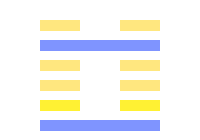
3.1.2.5 (3 > 7) - THE KUN HEXAGRAM
- 1. The first line, undivided, shows the difficulty (its subject has) in advancing. It will be advantageous for him to abide correct and firm; advantageous (also) to be made a feudal ruler.
- 2. The second line, divided, shows (its subject) distressed and obliged to return; (even) the horses of her chariot (also) seem to be retreating. (But) not by a spoiler (is she assailed), but by one who seeks her to be his wife. The young lady maintains her firm correctness, and declines a union. After ten years she will be united, and have children.
- 5. The fifth line, undivided, shows the difficulties in the way of (its subject's) dispensing the rich favours that might be expected from him. With firmness and correctness there will be good fortune in small things; (even) with them in great things there will be evil.
3.1.2.5 (3 > 7) - Listening to the good recommendations
One invests their business with the help of an experienced advisor.
Bing DeepL Google Yandex3.1.2.5 (3 > 7) - Listening to the good recommendations
One invests their business with the help of an experienced advisor.
Bing DeepL Google Yandex3.1.2.5 (3 > 7) - T’un, la difficulté initiale
T’un et tchun : A. 1. Bourgeon, pousse ; 2. Croissance, activité ; 3. Grandir, avancer. — B. Difficultés, arrêté dans son avancement, échec.
- 1. Pour s’établir solidement, il faut se maintenir en fermeté et droiture. (Pour maintenir le royaume), il est bon de constituer des chefs féodaux. Bien qu’on ait des difficultés, la volonté doit toujours s’attacher au devoir. Si, bien qu’élevé, on condescend aux besoins des petits, on s’attachera fortement le peuple.
-
2. 2a. Tchun est comme arrêté par les difficultés, comme un cavalier dont le cheval veut reculer (ou : un cheval monté qui veut...).
2b. C’est comme la jeune fille qui veut épouser un brigand ravisseur, elle doit rester inébranlable et attendre (plutôt) dix ans. (Malgré cela), elle pourra alors se marier et être mère. (Il est ici question de difficultés.)
Un équipage solide, l’enfantement après dix ans indique le retour à la prospérité, à l’avancement. -
5. Dans le développement de la sève des bourgeons, si elle se répand modérément, la croissance sera heureuse ; si elle se répand trop, le croissance sera empêchée.
Il en est ainsi si elle se répand avant d’être suffisamment riche et forte.
Obstacle au développement : s’il est petit, l’issue peut être heureuse ; s’il est grand, fin malheureuse.
3.1.2.5 (3 > 7) - Ecouter les bons conseils
On place ses affaires en s'aidant d'un conseiller expérimenté.
Bing DeepL Google Yandex3.1.2.5 (3 > 7) - Megoldás
- 1. Példamutató ha valaki mások segítségére siet a nehézségek ellenére.
- 2. Megbízható kapcsolatokat kell kialakítania mielőtt mások elfogadnák.
- 5. Tudni akar mielőtt döntene.

3.3.5 (3 > 36) - THE KUN HEXAGRAM
- 3. The third line, divided, shows one following the deer without (the guidance of) the forester, and only finding himself in the midst of the forest. The superior man, acquainted with the secret risks, thinks it better to give up the chase. If he went forward, he would regret it.
- 5. The fifth line, undivided, shows the difficulties in the way of (its subject's) dispensing the rich favours that might be expected from him. With firmness and correctness there will be good fortune in small things; (even) with them in great things there will be evil.
3.3.5 (3 > 36) - Resolving difficulties
One wishes to others a quick recovery and gives them reason for hope.
Bing DeepL Google Yandex3.3.5 (3 > 36) - Resolving difficulties
One wishes to others a quick recovery and gives them reason for hope.
Bing DeepL Google Yandex3.3.5 (3 > 36) - T’un, la difficulté initiale
T’un et tchun : A. 1. Bourgeon, pousse ; 2. Croissance, activité ; 3. Grandir, avancer. — B. Difficultés, arrêté dans son avancement, échec.
-
3. Lorsque le gibier poursuivi s’enfonce inopinément dans une forêt profonde, le sage aime mieux l’abandonner que de s’exposer au danger. S’il l’y poursuit, il aura lieu de s’en repentir.
Il sera réduit à l’extrémité. -
5. Dans le développement de la sève des bourgeons, si elle se répand modérément, la croissance sera heureuse ; si elle se répand trop, le croissance sera empêchée.
Il en est ainsi si elle se répand avant d’être suffisamment riche et forte.
Obstacle au développement : s’il est petit, l’issue peut être heureuse ; s’il est grand, fin malheureuse.
3.3.5 (3 > 36) - Remédier aux difficultés
On souhaite aux autres un bon rétablissement et on leur donne des raisons d'espérer.
Bing DeepL Google Yandex3.3.5 (3 > 36) - Megoldás
- 3. Magányosan halad ismeretlen terepen. Vezetőt kell keresnie vagy visszafordulnia.
- 5. Tudni akar mielőtt döntene.
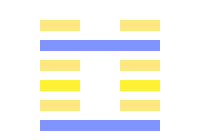
3.1.3.5 (3 > 15) - THE KUN HEXAGRAM
- 1. The first line, undivided, shows the difficulty (its subject has) in advancing. It will be advantageous for him to abide correct and firm; advantageous (also) to be made a feudal ruler.
- 3. The third line, divided, shows one following the deer without (the guidance of) the forester, and only finding himself in the midst of the forest. The superior man, acquainted with the secret risks, thinks it better to give up the chase. If he went forward, he would regret it.
- 5. The fifth line, undivided, shows the difficulties in the way of (its subject's) dispensing the rich favours that might be expected from him. With firmness and correctness there will be good fortune in small things; (even) with them in great things there will be evil.
3.1.3.5 (3 > 15) - Resolving difficulties
One starts by smelling oneself before taking a bath.
Bing DeepL Google Yandex3.1.3.5 (3 > 15) - Resolving difficulties
One starts by smelling oneself before taking a bath.
Bing DeepL Google Yandex3.1.3.5 (3 > 15) - T’un, la difficulté initiale
T’un et tchun : A. 1. Bourgeon, pousse ; 2. Croissance, activité ; 3. Grandir, avancer. — B. Difficultés, arrêté dans son avancement, échec.
- 1. Pour s’établir solidement, il faut se maintenir en fermeté et droiture. (Pour maintenir le royaume), il est bon de constituer des chefs féodaux. Bien qu’on ait des difficultés, la volonté doit toujours s’attacher au devoir. Si, bien qu’élevé, on condescend aux besoins des petits, on s’attachera fortement le peuple.
-
3. Lorsque le gibier poursuivi s’enfonce inopinément dans une forêt profonde, le sage aime mieux l’abandonner que de s’exposer au danger. S’il l’y poursuit, il aura lieu de s’en repentir.
Il sera réduit à l’extrémité. -
5. Dans le développement de la sève des bourgeons, si elle se répand modérément, la croissance sera heureuse ; si elle se répand trop, le croissance sera empêchée.
Il en est ainsi si elle se répand avant d’être suffisamment riche et forte.
Obstacle au développement : s’il est petit, l’issue peut être heureuse ; s’il est grand, fin malheureuse.
3.1.3.5 (3 > 15) - Remédier aux difficultés
On commence par se sentir avant de prendre un bain.
Bing DeepL Google Yandex3.1.3.5 (3 > 15) - Megoldás
- 1. Példamutató ha valaki mások segítségére siet a nehézségek ellenére.
- 3. Magányosan halad ismeretlen terepen. Vezetőt kell keresnie vagy visszafordulnia.
- 5. Tudni akar mielőtt döntene.

3.2.3.5 (3 > 11) - THE KUN HEXAGRAM
- 2. The second line, divided, shows (its subject) distressed and obliged to return; (even) the horses of her chariot (also) seem to be retreating. (But) not by a spoiler (is she assailed), but by one who seeks her to be his wife. The young lady maintains her firm correctness, and declines a union. After ten years she will be united, and have children.
- 3. The third line, divided, shows one following the deer without (the guidance of) the forester, and only finding himself in the midst of the forest. The superior man, acquainted with the secret risks, thinks it better to give up the chase. If he went forward, he would regret it.
- 5. The fifth line, undivided, shows the difficulties in the way of (its subject's) dispensing the rich favours that might be expected from him. With firmness and correctness there will be good fortune in small things; (even) with them in great things there will be evil.
3.2.3.5 (3 > 11) - Resolving difficulties
One is working to clarify a delicate situation.
Bing DeepL Google Yandex3.2.3.5 (3 > 11) - Resolving difficulties
One is working to clarify a delicate situation.
Bing DeepL Google Yandex3.2.3.5 (3 > 11) - T’un, la difficulté initiale
T’un et tchun : A. 1. Bourgeon, pousse ; 2. Croissance, activité ; 3. Grandir, avancer. — B. Difficultés, arrêté dans son avancement, échec.
-
2. 2a. Tchun est comme arrêté par les difficultés, comme un cavalier dont le cheval veut reculer (ou : un cheval monté qui veut...).
2b. C’est comme la jeune fille qui veut épouser un brigand ravisseur, elle doit rester inébranlable et attendre (plutôt) dix ans. (Malgré cela), elle pourra alors se marier et être mère. (Il est ici question de difficultés.)
Un équipage solide, l’enfantement après dix ans indique le retour à la prospérité, à l’avancement. -
3. Lorsque le gibier poursuivi s’enfonce inopinément dans une forêt profonde, le sage aime mieux l’abandonner que de s’exposer au danger. S’il l’y poursuit, il aura lieu de s’en repentir.
Il sera réduit à l’extrémité. -
5. Dans le développement de la sève des bourgeons, si elle se répand modérément, la croissance sera heureuse ; si elle se répand trop, le croissance sera empêchée.
Il en est ainsi si elle se répand avant d’être suffisamment riche et forte.
Obstacle au développement : s’il est petit, l’issue peut être heureuse ; s’il est grand, fin malheureuse.
3.2.3.5 (3 > 11) - Remédier aux difficultés
On travaille dans le but d'éclaircir une situation délicate.
Bing DeepL Google Yandex3.2.3.5 (3 > 11) - Megoldás
- 2. Megbízható kapcsolatokat kell kialakítania mielőtt mások elfogadnák.
- 3. Magányosan halad ismeretlen terepen. Vezetőt kell keresnie vagy visszafordulnia.
- 5. Tudni akar mielőtt döntene.
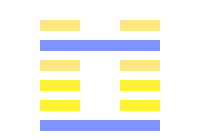
3.1.2.3.5 (3 > 46) - THE KUN HEXAGRAM
- 1. The first line, undivided, shows the difficulty (its subject has) in advancing. It will be advantageous for him to abide correct and firm; advantageous (also) to be made a feudal ruler.
- 2. The second line, divided, shows (its subject) distressed and obliged to return; (even) the horses of her chariot (also) seem to be retreating. (But) not by a spoiler (is she assailed), but by one who seeks her to be his wife. The young lady maintains her firm correctness, and declines a union. After ten years she will be united, and have children.
- 3. The third line, divided, shows one following the deer without (the guidance of) the forester, and only finding himself in the midst of the forest. The superior man, acquainted with the secret risks, thinks it better to give up the chase. If he went forward, he would regret it.
- 5. The fifth line, undivided, shows the difficulties in the way of (its subject's) dispensing the rich favours that might be expected from him. With firmness and correctness there will be good fortune in small things; (even) with them in great things there will be evil.
3.1.2.3.5 (3 > 46) - Knowing how to explain
One knows how to tell others what they have to carry out.
Bing DeepL Google Yandex3.1.2.3.5 (3 > 46) - Knowing how to explain
One knows how to tell others what they have to carry out.
Bing DeepL Google Yandex3.1.2.3.5 (3 > 46) - T’un, la difficulté initiale
T’un et tchun : A. 1. Bourgeon, pousse ; 2. Croissance, activité ; 3. Grandir, avancer. — B. Difficultés, arrêté dans son avancement, échec.
- 1. Pour s’établir solidement, il faut se maintenir en fermeté et droiture. (Pour maintenir le royaume), il est bon de constituer des chefs féodaux. Bien qu’on ait des difficultés, la volonté doit toujours s’attacher au devoir. Si, bien qu’élevé, on condescend aux besoins des petits, on s’attachera fortement le peuple.
-
2. 2a. Tchun est comme arrêté par les difficultés, comme un cavalier dont le cheval veut reculer (ou : un cheval monté qui veut...).
2b. C’est comme la jeune fille qui veut épouser un brigand ravisseur, elle doit rester inébranlable et attendre (plutôt) dix ans. (Malgré cela), elle pourra alors se marier et être mère. (Il est ici question de difficultés.)
Un équipage solide, l’enfantement après dix ans indique le retour à la prospérité, à l’avancement. -
3. Lorsque le gibier poursuivi s’enfonce inopinément dans une forêt profonde, le sage aime mieux l’abandonner que de s’exposer au danger. S’il l’y poursuit, il aura lieu de s’en repentir.
Il sera réduit à l’extrémité. -
5. Dans le développement de la sève des bourgeons, si elle se répand modérément, la croissance sera heureuse ; si elle se répand trop, le croissance sera empêchée.
Il en est ainsi si elle se répand avant d’être suffisamment riche et forte.
Obstacle au développement : s’il est petit, l’issue peut être heureuse ; s’il est grand, fin malheureuse.
3.1.2.3.5 (3 > 46) - Savoir expliquer
On sait comment faire pour dire aux autres ce qu'ils ont à accomplir.
Bing DeepL Google Yandex3.1.2.3.5 (3 > 46) - Megoldás
- 1. Példamutató ha valaki mások segítségére siet a nehézségek ellenére.
- 2. Megbízható kapcsolatokat kell kialakítania mielőtt mások elfogadnák.
- 3. Magányosan halad ismeretlen terepen. Vezetőt kell keresnie vagy visszafordulnia.
- 5. Tudni akar mielőtt döntene.

3.4.5 (3 > 51) - THE KUN HEXAGRAM
- 4. The fourth line, divided, shows (its subject as a lady), the horses of whose chariot appear in retreat. She seeks, however, (the help of) him who seeks her to be his wife. Advance will be fortunate; all will turn out advantageously.
- 5. The fifth line, undivided, shows the difficulties in the way of (its subject's) dispensing the rich favours that might be expected from him. With firmness and correctness there will be good fortune in small things; (even) with them in great things there will be evil.
3.4.5 (3 > 51) - Knowing how to be silent so as not to betray oneself
One does not talk about the impressions that others make on them to those who could understand.
Bing DeepL Google Yandex3.4.5 (3 > 51) - Knowing how to be silent so as not to betray oneself
One does not talk about the impressions that others make on them to those who could understand.
Bing DeepL Google Yandex3.4.5 (3 > 51) - T’un, la difficulté initiale
T’un et tchun : A. 1. Bourgeon, pousse ; 2. Croissance, activité ; 3. Grandir, avancer. — B. Difficultés, arrêté dans son avancement, échec.
-
4. Si elle est demandée en mariage selon les rites, qu’elle y aille et ce sera bien. Cela lui sera avantageux.
Il en est de même de l’équipage arrêté qui reprend sa course. -
5. Dans le développement de la sève des bourgeons, si elle se répand modérément, la croissance sera heureuse ; si elle se répand trop, le croissance sera empêchée.
Il en est ainsi si elle se répand avant d’être suffisamment riche et forte.
Obstacle au développement : s’il est petit, l’issue peut être heureuse ; s’il est grand, fin malheureuse.
3.4.5 (3 > 51) - Savoir se taire pour ne pas se trahir
On ne parle pas des impressions que les autres nous font avec ceux qui pourraient les comprendre.
Bing DeepL Google Yandex3.4.5 (3 > 51) - Megoldás
- 4. Segítséget kap ha kivárja a sorát.
- 5. Tudni akar mielőtt döntene.
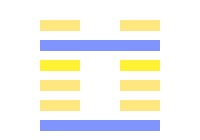
3.1.4.5 (3 > 16) - THE KUN HEXAGRAM
- 1. The first line, undivided, shows the difficulty (its subject has) in advancing. It will be advantageous for him to abide correct and firm; advantageous (also) to be made a feudal ruler.
- 4. The fourth line, divided, shows (its subject as a lady), the horses of whose chariot appear in retreat. She seeks, however, (the help of) him who seeks her to be his wife. Advance will be fortunate; all will turn out advantageously.
- 5. The fifth line, undivided, shows the difficulties in the way of (its subject's) dispensing the rich favours that might be expected from him. With firmness and correctness there will be good fortune in small things; (even) with them in great things there will be evil.
3.1.4.5 (3 > 16) - Going to see on the field
One starts by making studies before coming up with a theory.
Bing DeepL Google Yandex3.1.4.5 (3 > 16) - Going to see on the field
One starts by making studies before coming up with a theory.
Bing DeepL Google Yandex3.1.4.5 (3 > 16) - T’un, la difficulté initiale
T’un et tchun : A. 1. Bourgeon, pousse ; 2. Croissance, activité ; 3. Grandir, avancer. — B. Difficultés, arrêté dans son avancement, échec.
- 1. Pour s’établir solidement, il faut se maintenir en fermeté et droiture. (Pour maintenir le royaume), il est bon de constituer des chefs féodaux. Bien qu’on ait des difficultés, la volonté doit toujours s’attacher au devoir. Si, bien qu’élevé, on condescend aux besoins des petits, on s’attachera fortement le peuple.
-
4. Si elle est demandée en mariage selon les rites, qu’elle y aille et ce sera bien. Cela lui sera avantageux.
Il en est de même de l’équipage arrêté qui reprend sa course. -
5. Dans le développement de la sève des bourgeons, si elle se répand modérément, la croissance sera heureuse ; si elle se répand trop, le croissance sera empêchée.
Il en est ainsi si elle se répand avant d’être suffisamment riche et forte.
Obstacle au développement : s’il est petit, l’issue peut être heureuse ; s’il est grand, fin malheureuse.
3.1.4.5 (3 > 16) - Aller voir sur le terrain
On commence par faire des études avant d'avancer une théorie.
Bing DeepL Google Yandex3.1.4.5 (3 > 16) - Megoldás
- 1. Példamutató ha valaki mások segítségére siet a nehézségek ellenére.
- 4. Segítséget kap ha kivárja a sorát.
- 5. Tudni akar mielőtt döntene.

3.2.4.5 (3 > 54) - THE KUN HEXAGRAM
- 2. The second line, divided, shows (its subject) distressed and obliged to return; (even) the horses of her chariot (also) seem to be retreating. (But) not by a spoiler (is she assailed), but by one who seeks her to be his wife. The young lady maintains her firm correctness, and declines a union. After ten years she will be united, and have children.
- 4. The fourth line, divided, shows (its subject as a lady), the horses of whose chariot appear in retreat. She seeks, however, (the help of) him who seeks her to be his wife. Advance will be fortunate; all will turn out advantageously.
- 5. The fifth line, undivided, shows the difficulties in the way of (its subject's) dispensing the rich favours that might be expected from him. With firmness and correctness there will be good fortune in small things; (even) with them in great things there will be evil.
3.2.4.5 (3 > 54) - Resolving difficulties
One receives an action plan that will have unforeseen consequences.
Bing DeepL Google Yandex3.2.4.5 (3 > 54) - Resolving difficulties
One receives an action plan that will have unforeseen consequences.
Bing DeepL Google Yandex3.2.4.5 (3 > 54) - T’un, la difficulté initiale
T’un et tchun : A. 1. Bourgeon, pousse ; 2. Croissance, activité ; 3. Grandir, avancer. — B. Difficultés, arrêté dans son avancement, échec.
-
2. 2a. Tchun est comme arrêté par les difficultés, comme un cavalier dont le cheval veut reculer (ou : un cheval monté qui veut...).
2b. C’est comme la jeune fille qui veut épouser un brigand ravisseur, elle doit rester inébranlable et attendre (plutôt) dix ans. (Malgré cela), elle pourra alors se marier et être mère. (Il est ici question de difficultés.)
Un équipage solide, l’enfantement après dix ans indique le retour à la prospérité, à l’avancement. -
4. Si elle est demandée en mariage selon les rites, qu’elle y aille et ce sera bien. Cela lui sera avantageux.
Il en est de même de l’équipage arrêté qui reprend sa course. -
5. Dans le développement de la sève des bourgeons, si elle se répand modérément, la croissance sera heureuse ; si elle se répand trop, le croissance sera empêchée.
Il en est ainsi si elle se répand avant d’être suffisamment riche et forte.
Obstacle au développement : s’il est petit, l’issue peut être heureuse ; s’il est grand, fin malheureuse.
3.2.4.5 (3 > 54) - Remédier aux difficultés
On reçoit un plan d'action qui aura des conséquences imprévues.
Bing DeepL Google Yandex3.2.4.5 (3 > 54) - Megoldás
- 2. Megbízható kapcsolatokat kell kialakítania mielőtt mások elfogadnák.
- 4. Segítséget kap ha kivárja a sorát.
- 5. Tudni akar mielőtt döntene.
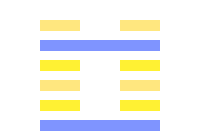
3.1.2.4.5 (3 > 40) - THE KUN HEXAGRAM
- 1. The first line, undivided, shows the difficulty (its subject has) in advancing. It will be advantageous for him to abide correct and firm; advantageous (also) to be made a feudal ruler.
- 2. The second line, divided, shows (its subject) distressed and obliged to return; (even) the horses of her chariot (also) seem to be retreating. (But) not by a spoiler (is she assailed), but by one who seeks her to be his wife. The young lady maintains her firm correctness, and declines a union. After ten years she will be united, and have children.
- 4. The fourth line, divided, shows (its subject as a lady), the horses of whose chariot appear in retreat. She seeks, however, (the help of) him who seeks her to be his wife. Advance will be fortunate; all will turn out advantageously.
- 5. The fifth line, undivided, shows the difficulties in the way of (its subject's) dispensing the rich favours that might be expected from him. With firmness and correctness there will be good fortune in small things; (even) with them in great things there will be evil.
3.1.2.4.5 (3 > 40) - Taking care of the weak first
One gives priority to the most needy.
Bing DeepL Google Yandex3.1.2.4.5 (3 > 40) - Taking care of the weak first
One gives priority to the most needy.
Bing DeepL Google Yandex3.1.2.4.5 (3 > 40) - T’un, la difficulté initiale
T’un et tchun : A. 1. Bourgeon, pousse ; 2. Croissance, activité ; 3. Grandir, avancer. — B. Difficultés, arrêté dans son avancement, échec.
- 1. Pour s’établir solidement, il faut se maintenir en fermeté et droiture. (Pour maintenir le royaume), il est bon de constituer des chefs féodaux. Bien qu’on ait des difficultés, la volonté doit toujours s’attacher au devoir. Si, bien qu’élevé, on condescend aux besoins des petits, on s’attachera fortement le peuple.
-
2. 2a. Tchun est comme arrêté par les difficultés, comme un cavalier dont le cheval veut reculer (ou : un cheval monté qui veut...).
2b. C’est comme la jeune fille qui veut épouser un brigand ravisseur, elle doit rester inébranlable et attendre (plutôt) dix ans. (Malgré cela), elle pourra alors se marier et être mère. (Il est ici question de difficultés.)
Un équipage solide, l’enfantement après dix ans indique le retour à la prospérité, à l’avancement. -
4. Si elle est demandée en mariage selon les rites, qu’elle y aille et ce sera bien. Cela lui sera avantageux.
Il en est de même de l’équipage arrêté qui reprend sa course. -
5. Dans le développement de la sève des bourgeons, si elle se répand modérément, la croissance sera heureuse ; si elle se répand trop, le croissance sera empêchée.
Il en est ainsi si elle se répand avant d’être suffisamment riche et forte.
Obstacle au développement : s’il est petit, l’issue peut être heureuse ; s’il est grand, fin malheureuse.
3.1.2.4.5 (3 > 40) - S'occuper d'abord des faibles
On place en priorité les plus nécessiteux.
Bing DeepL Google Yandex3.1.2.4.5 (3 > 40) - Megoldás
- 1. Példamutató ha valaki mások segítségére siet a nehézségek ellenére.
- 2. Megbízható kapcsolatokat kell kialakítania mielőtt mások elfogadnák.
- 4. Segítséget kap ha kivárja a sorát.
- 5. Tudni akar mielőtt döntene.

3.3.4.5 (3 > 55) - THE KUN HEXAGRAM
- 3. The third line, divided, shows one following the deer without (the guidance of) the forester, and only finding himself in the midst of the forest. The superior man, acquainted with the secret risks, thinks it better to give up the chase. If he went forward, he would regret it.
- 4. The fourth line, divided, shows (its subject as a lady), the horses of whose chariot appear in retreat. She seeks, however, (the help of) him who seeks her to be his wife. Advance will be fortunate; all will turn out advantageously.
- 5. The fifth line, undivided, shows the difficulties in the way of (its subject's) dispensing the rich favours that might be expected from him. With firmness and correctness there will be good fortune in small things; (even) with them in great things there will be evil.
3.3.4.5 (3 > 55) - Resolving difficulties
One knows that they will have things to say once others have finished.
Bing DeepL Google Yandex3.3.4.5 (3 > 55) - Resolving difficulties
One knows that they will have things to say once others have finished.
Bing DeepL Google Yandex3.3.4.5 (3 > 55) - T’un, la difficulté initiale
T’un et tchun : A. 1. Bourgeon, pousse ; 2. Croissance, activité ; 3. Grandir, avancer. — B. Difficultés, arrêté dans son avancement, échec.
-
3. Lorsque le gibier poursuivi s’enfonce inopinément dans une forêt profonde, le sage aime mieux l’abandonner que de s’exposer au danger. S’il l’y poursuit, il aura lieu de s’en repentir.
Il sera réduit à l’extrémité. -
4. Si elle est demandée en mariage selon les rites, qu’elle y aille et ce sera bien. Cela lui sera avantageux.
Il en est de même de l’équipage arrêté qui reprend sa course. -
5. Dans le développement de la sève des bourgeons, si elle se répand modérément, la croissance sera heureuse ; si elle se répand trop, le croissance sera empêchée.
Il en est ainsi si elle se répand avant d’être suffisamment riche et forte.
Obstacle au développement : s’il est petit, l’issue peut être heureuse ; s’il est grand, fin malheureuse.
3.3.4.5 (3 > 55) - Remédier aux difficultés
On sait que l'on aura des choses à dire une fois que les autres auront terminé.
Bing DeepL Google Yandex3.3.4.5 (3 > 55) - Megoldás
- 3. Magányosan halad ismeretlen terepen. Vezetőt kell keresnie vagy visszafordulnia.
- 4. Segítséget kap ha kivárja a sorát.
- 5. Tudni akar mielőtt döntene.
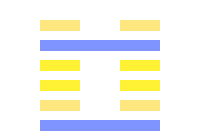
3.1.3.4.5 (3 > 62) - THE KUN HEXAGRAM
- 1. The first line, undivided, shows the difficulty (its subject has) in advancing. It will be advantageous for him to abide correct and firm; advantageous (also) to be made a feudal ruler.
- 3. The third line, divided, shows one following the deer without (the guidance of) the forester, and only finding himself in the midst of the forest. The superior man, acquainted with the secret risks, thinks it better to give up the chase. If he went forward, he would regret it.
- 4. The fourth line, divided, shows (its subject as a lady), the horses of whose chariot appear in retreat. She seeks, however, (the help of) him who seeks her to be his wife. Advance will be fortunate; all will turn out advantageously.
- 5. The fifth line, undivided, shows the difficulties in the way of (its subject's) dispensing the rich favours that might be expected from him. With firmness and correctness there will be good fortune in small things; (even) with them in great things there will be evil.
3.1.3.4.5 (3 > 62) - Resolving difficulties
One wants to compete against those who win every time, but those do not want to take up the challenge.
Bing DeepL Google Yandex3.1.3.4.5 (3 > 62) - Resolving difficulties
One wants to compete against those who win every time, but those do not want to take up the challenge.
Bing DeepL Google Yandex3.1.3.4.5 (3 > 62) - T’un, la difficulté initiale
T’un et tchun : A. 1. Bourgeon, pousse ; 2. Croissance, activité ; 3. Grandir, avancer. — B. Difficultés, arrêté dans son avancement, échec.
- 1. Pour s’établir solidement, il faut se maintenir en fermeté et droiture. (Pour maintenir le royaume), il est bon de constituer des chefs féodaux. Bien qu’on ait des difficultés, la volonté doit toujours s’attacher au devoir. Si, bien qu’élevé, on condescend aux besoins des petits, on s’attachera fortement le peuple.
-
3. Lorsque le gibier poursuivi s’enfonce inopinément dans une forêt profonde, le sage aime mieux l’abandonner que de s’exposer au danger. S’il l’y poursuit, il aura lieu de s’en repentir.
Il sera réduit à l’extrémité. -
4. Si elle est demandée en mariage selon les rites, qu’elle y aille et ce sera bien. Cela lui sera avantageux.
Il en est de même de l’équipage arrêté qui reprend sa course. -
5. Dans le développement de la sève des bourgeons, si elle se répand modérément, la croissance sera heureuse ; si elle se répand trop, le croissance sera empêchée.
Il en est ainsi si elle se répand avant d’être suffisamment riche et forte.
Obstacle au développement : s’il est petit, l’issue peut être heureuse ; s’il est grand, fin malheureuse.
3.1.3.4.5 (3 > 62) - Remédier aux difficultés
On souhaite se mesurer avec ceux qui gagnent tout le temps, mais ceux-là ne veulent pas relever le défi.
Bing DeepL Google Yandex3.1.3.4.5 (3 > 62) - Megoldás
- 1. Példamutató ha valaki mások segítségére siet a nehézségek ellenére.
- 3. Magányosan halad ismeretlen terepen. Vezetőt kell keresnie vagy visszafordulnia.
- 4. Segítséget kap ha kivárja a sorát.
- 5. Tudni akar mielőtt döntene.

3.2.3.4.5 (3 > 34) - THE KUN HEXAGRAM
- 2. The second line, divided, shows (its subject) distressed and obliged to return; (even) the horses of her chariot (also) seem to be retreating. (But) not by a spoiler (is she assailed), but by one who seeks her to be his wife. The young lady maintains her firm correctness, and declines a union. After ten years she will be united, and have children.
- 3. The third line, divided, shows one following the deer without (the guidance of) the forester, and only finding himself in the midst of the forest. The superior man, acquainted with the secret risks, thinks it better to give up the chase. If he went forward, he would regret it.
- 4. The fourth line, divided, shows (its subject as a lady), the horses of whose chariot appear in retreat. She seeks, however, (the help of) him who seeks her to be his wife. Advance will be fortunate; all will turn out advantageously.
- 5. The fifth line, undivided, shows the difficulties in the way of (its subject's) dispensing the rich favours that might be expected from him. With firmness and correctness there will be good fortune in small things; (even) with them in great things there will be evil.
3.2.3.4.5 (3 > 34) - Resolving difficulties
One acts as if others did not hear.
Bing DeepL Google Yandex3.2.3.4.5 (3 > 34) - Resolving difficulties
One acts as if others did not hear.
Bing DeepL Google Yandex3.2.3.4.5 (3 > 34) - T’un, la difficulté initiale
T’un et tchun : A. 1. Bourgeon, pousse ; 2. Croissance, activité ; 3. Grandir, avancer. — B. Difficultés, arrêté dans son avancement, échec.
-
2. 2a. Tchun est comme arrêté par les difficultés, comme un cavalier dont le cheval veut reculer (ou : un cheval monté qui veut...).
2b. C’est comme la jeune fille qui veut épouser un brigand ravisseur, elle doit rester inébranlable et attendre (plutôt) dix ans. (Malgré cela), elle pourra alors se marier et être mère. (Il est ici question de difficultés.)
Un équipage solide, l’enfantement après dix ans indique le retour à la prospérité, à l’avancement. -
3. Lorsque le gibier poursuivi s’enfonce inopinément dans une forêt profonde, le sage aime mieux l’abandonner que de s’exposer au danger. S’il l’y poursuit, il aura lieu de s’en repentir.
Il sera réduit à l’extrémité. -
4. Si elle est demandée en mariage selon les rites, qu’elle y aille et ce sera bien. Cela lui sera avantageux.
Il en est de même de l’équipage arrêté qui reprend sa course. -
5. Dans le développement de la sève des bourgeons, si elle se répand modérément, la croissance sera heureuse ; si elle se répand trop, le croissance sera empêchée.
Il en est ainsi si elle se répand avant d’être suffisamment riche et forte.
Obstacle au développement : s’il est petit, l’issue peut être heureuse ; s’il est grand, fin malheureuse.
3.2.3.4.5 (3 > 34) - Remédier aux difficultés
On fait comme si les autres n'avaient pas entendu.
Bing DeepL Google Yandex3.2.3.4.5 (3 > 34) - Megoldás
- 2. Megbízható kapcsolatokat kell kialakítania mielőtt mások elfogadnák.
- 3. Magányosan halad ismeretlen terepen. Vezetőt kell keresnie vagy visszafordulnia.
- 4. Segítséget kap ha kivárja a sorát.
- 5. Tudni akar mielőtt döntene.

3.1.2.3.4.5 (3 > 32) - THE KUN HEXAGRAM
- 1. The first line, undivided, shows the difficulty (its subject has) in advancing. It will be advantageous for him to abide correct and firm; advantageous (also) to be made a feudal ruler.
- 2. The second line, divided, shows (its subject) distressed and obliged to return; (even) the horses of her chariot (also) seem to be retreating. (But) not by a spoiler (is she assailed), but by one who seeks her to be his wife. The young lady maintains her firm correctness, and declines a union. After ten years she will be united, and have children.
- 3. The third line, divided, shows one following the deer without (the guidance of) the forester, and only finding himself in the midst of the forest. The superior man, acquainted with the secret risks, thinks it better to give up the chase. If he went forward, he would regret it.
- 4. The fourth line, divided, shows (its subject as a lady), the horses of whose chariot appear in retreat. She seeks, however, (the help of) him who seeks her to be his wife. Advance will be fortunate; all will turn out advantageously.
- 5. The fifth line, undivided, shows the difficulties in the way of (its subject's) dispensing the rich favours that might be expected from him. With firmness and correctness there will be good fortune in small things; (even) with them in great things there will be evil.
3.1.2.3.4.5 (3 > 32) - To wait before declaring a winner
One wants to take their time before declaring that others have succeeded.
Bing DeepL Google Yandex3.1.2.3.4.5 (3 > 32) - To wait before declaring a winner
One wants to take their time before declaring that others have succeeded.
Bing DeepL Google Yandex3.1.2.3.4.5 (3 > 32) - T’un, la difficulté initiale
T’un et tchun : A. 1. Bourgeon, pousse ; 2. Croissance, activité ; 3. Grandir, avancer. — B. Difficultés, arrêté dans son avancement, échec.
- 1. Pour s’établir solidement, il faut se maintenir en fermeté et droiture. (Pour maintenir le royaume), il est bon de constituer des chefs féodaux. Bien qu’on ait des difficultés, la volonté doit toujours s’attacher au devoir. Si, bien qu’élevé, on condescend aux besoins des petits, on s’attachera fortement le peuple.
-
2. 2a. Tchun est comme arrêté par les difficultés, comme un cavalier dont le cheval veut reculer (ou : un cheval monté qui veut...).
2b. C’est comme la jeune fille qui veut épouser un brigand ravisseur, elle doit rester inébranlable et attendre (plutôt) dix ans. (Malgré cela), elle pourra alors se marier et être mère. (Il est ici question de difficultés.)
Un équipage solide, l’enfantement après dix ans indique le retour à la prospérité, à l’avancement. -
3. Lorsque le gibier poursuivi s’enfonce inopinément dans une forêt profonde, le sage aime mieux l’abandonner que de s’exposer au danger. S’il l’y poursuit, il aura lieu de s’en repentir.
Il sera réduit à l’extrémité. -
4. Si elle est demandée en mariage selon les rites, qu’elle y aille et ce sera bien. Cela lui sera avantageux.
Il en est de même de l’équipage arrêté qui reprend sa course. -
5. Dans le développement de la sève des bourgeons, si elle se répand modérément, la croissance sera heureuse ; si elle se répand trop, le croissance sera empêchée.
Il en est ainsi si elle se répand avant d’être suffisamment riche et forte.
Obstacle au développement : s’il est petit, l’issue peut être heureuse ; s’il est grand, fin malheureuse.
3.1.2.3.4.5 (3 > 32) - Attendre avant de déclarer un vainqueur
On veut prendre son temps avant de déclarer que les autres ont réussi.
Bing DeepL Google Yandex3.1.2.3.4.5 (3 > 32) - Megoldás
- 1. Példamutató ha valaki mások segítségére siet a nehézségek ellenére.
- 2. Megbízható kapcsolatokat kell kialakítania mielőtt mások elfogadnák.
- 3. Magányosan halad ismeretlen terepen. Vezetőt kell keresnie vagy visszafordulnia.
- 4. Segítséget kap ha kivárja a sorát.
- 5. Tudni akar mielőtt döntene.

3.6 (3 > 42) - THE KUN HEXAGRAM
The topmost line, divided, shows (its subject) with the horses of his chariot obliged to retreat, and weeping tears of blood in streams.
Bing DeepL Google Yandex3.6 (3 > 42) - Resolving difficulties
One commits themself alone because others don't want to get involved without proofs. So, one pretends to be disappointed so that they understand that they are no longer welcome.
Bing DeepL Google Yandex3.6 (3 > 42) - Resolving difficulties
One commits themself alone because others don't want to get involved without proofs. So, one pretends to be disappointed so that they understand that they are no longer welcome.
Bing DeepL Google Yandex3.6 (3 > 42) - T’un, la difficulté initiale
T’un et tchun : A. 1. Bourgeon, pousse ; 2. Croissance, activité ; 3. Grandir, avancer. — B. Difficultés, arrêté dans son avancement, échec.
L’avancement, arrêté comme un cheval monté qui recule, fait répandre des larmes amères et abondantes.
Bing DeepL Google Yandex3.6 (3 > 42) - Remédier aux difficultés
On s'engage seul car les autres ne veulent pas s'impliquer sans preuves. Alors on fait semblant d'être déçu pour qu'ils comprennent qu'ils ne sont plus les bienvenus.
Bing DeepL Google Yandex3.6 (3 > 42) - Megoldás
Egyedül folytatja tovább mert mások biztosítékokat akarnak mielőtt támogatnák a fejlesztéseket. Tétotvázás helyett meg kell változtatnia szomszédságát hogy túlléphessen a nehézségeken.
Bing DeepL Google Yandex
3.1.6 (3 > 20) - THE KUN HEXAGRAM
- 1. The first line, undivided, shows the difficulty (its subject has) in advancing. It will be advantageous for him to abide correct and firm; advantageous (also) to be made a feudal ruler.
- 6. The topmost line, divided, shows (its subject) with the horses of his chariot obliged to retreat, and weeping tears of blood in streams.
3.1.6 (3 > 20) - Knowing before others
One shows others that one already knows what they have to tell.
Bing DeepL Google Yandex3.1.6 (3 > 20) - Knowing before others
One shows others that one already knows what they have to tell.
Bing DeepL Google Yandex3.1.6 (3 > 20) - T’un, la difficulté initiale
T’un et tchun : A. 1. Bourgeon, pousse ; 2. Croissance, activité ; 3. Grandir, avancer. — B. Difficultés, arrêté dans son avancement, échec.
- 1. Pour s’établir solidement, il faut se maintenir en fermeté et droiture. (Pour maintenir le royaume), il est bon de constituer des chefs féodaux. Bien qu’on ait des difficultés, la volonté doit toujours s’attacher au devoir. Si, bien qu’élevé, on condescend aux besoins des petits, on s’attachera fortement le peuple.
- 6. L’avancement, arrêté comme un cheval monté qui recule, fait répandre des larmes amères et abondantes.
3.1.6 (3 > 20) - Savoir avant les autres
On montre aux autres que l'on connait déjà ce qu'ils ont à raconter.
Bing DeepL Google Yandex3.1.6 (3 > 20) - Megoldás
- 1. Példamutató ha valaki mások segítségére siet a nehézségek ellenére.
- 6. Egyedül folytatja tovább mert mások biztosítékokat akarnak mielőtt támogatnák a fejlesztéseket. Tétotvázás helyett meg kell változtatnia szomszédságát hogy túlléphessen a nehézségeken.

3.2.6 (3 > 61) - THE KUN HEXAGRAM
- 2. The second line, divided, shows (its subject) distressed and obliged to return; (even) the horses of her chariot (also) seem to be retreating. (But) not by a spoiler (is she assailed), but by one who seeks her to be his wife. The young lady maintains her firm correctness, and declines a union. After ten years she will be united, and have children.
- 6. The topmost line, divided, shows (its subject) with the horses of his chariot obliged to retreat, and weeping tears of blood in streams.
3.2.6 (3 > 61) - Seeing one's former companions again
One seizes the opportunity to be with those they prefer.
Bing DeepL Google Yandex3.2.6 (3 > 61) - Seeing one's former companions again
One seizes the opportunity to be with those they prefer.
Bing DeepL Google Yandex3.2.6 (3 > 61) - T’un, la difficulté initiale
T’un et tchun : A. 1. Bourgeon, pousse ; 2. Croissance, activité ; 3. Grandir, avancer. — B. Difficultés, arrêté dans son avancement, échec.
-
2. 2a. Tchun est comme arrêté par les difficultés, comme un cavalier dont le cheval veut reculer (ou : un cheval monté qui veut...).
2b. C’est comme la jeune fille qui veut épouser un brigand ravisseur, elle doit rester inébranlable et attendre (plutôt) dix ans. (Malgré cela), elle pourra alors se marier et être mère. (Il est ici question de difficultés.)
Un équipage solide, l’enfantement après dix ans indique le retour à la prospérité, à l’avancement. - 6. L’avancement, arrêté comme un cheval monté qui recule, fait répandre des larmes amères et abondantes.
3.2.6 (3 > 61) - Revoir ses anciens compagnons
On saisit sa chance pour être avec ceux que l'on préfère.
Bing DeepL Google Yandex3.2.6 (3 > 61) - Megoldás
- 2. Megbízható kapcsolatokat kell kialakítania mielőtt mások elfogadnák.
- 6. Egyedül folytatja tovább mert mások biztosítékokat akarnak mielőtt támogatnák a fejlesztéseket. Tétotvázás helyett meg kell változtatnia szomszédságát hogy túlléphessen a nehézségeken.

3.1.2.6 (3 > 59) - THE KUN HEXAGRAM
- 1. The first line, undivided, shows the difficulty (its subject has) in advancing. It will be advantageous for him to abide correct and firm; advantageous (also) to be made a feudal ruler.
- 2. The second line, divided, shows (its subject) distressed and obliged to return; (even) the horses of her chariot (also) seem to be retreating. (But) not by a spoiler (is she assailed), but by one who seeks her to be his wife. The young lady maintains her firm correctness, and declines a union. After ten years she will be united, and have children.
- 6. The topmost line, divided, shows (its subject) with the horses of his chariot obliged to retreat, and weeping tears of blood in streams.
3.1.2.6 (3 > 59) - Resolving difficulties
One anticipates violations of the expected conditions so they trust those who can adapt to them.
Bing DeepL Google Yandex3.1.2.6 (3 > 59) - Resolving difficulties
One anticipates violations of the expected conditions so they trust those who can adapt to them.
Bing DeepL Google Yandex3.1.2.6 (3 > 59) - T’un, la difficulté initiale
T’un et tchun : A. 1. Bourgeon, pousse ; 2. Croissance, activité ; 3. Grandir, avancer. — B. Difficultés, arrêté dans son avancement, échec.
- 1. Pour s’établir solidement, il faut se maintenir en fermeté et droiture. (Pour maintenir le royaume), il est bon de constituer des chefs féodaux. Bien qu’on ait des difficultés, la volonté doit toujours s’attacher au devoir. Si, bien qu’élevé, on condescend aux besoins des petits, on s’attachera fortement le peuple.
-
2. 2a. Tchun est comme arrêté par les difficultés, comme un cavalier dont le cheval veut reculer (ou : un cheval monté qui veut...).
2b. C’est comme la jeune fille qui veut épouser un brigand ravisseur, elle doit rester inébranlable et attendre (plutôt) dix ans. (Malgré cela), elle pourra alors se marier et être mère. (Il est ici question de difficultés.)
Un équipage solide, l’enfantement après dix ans indique le retour à la prospérité, à l’avancement. - 6. L’avancement, arrêté comme un cheval monté qui recule, fait répandre des larmes amères et abondantes.
3.1.2.6 (3 > 59) - Remédier aux difficultés
On prévoit des atteintes aux conditions prévues alors on se fie à ceux qui peuvent s'y adapter.
Bing DeepL Google Yandex3.1.2.6 (3 > 59) - Megoldás
- 1. Példamutató ha valaki mások segítségére siet a nehézségek ellenére.
- 2. Megbízható kapcsolatokat kell kialakítania mielőtt mások elfogadnák.
- 6. Egyedül folytatja tovább mert mások biztosítékokat akarnak mielőtt támogatnák a fejlesztéseket. Tétotvázás helyett meg kell változtatnia szomszédságát hogy túlléphessen a nehézségeken.

3.3.6 (3 > 37) - THE KUN HEXAGRAM
- 3. The third line, divided, shows one following the deer without (the guidance of) the forester, and only finding himself in the midst of the forest. The superior man, acquainted with the secret risks, thinks it better to give up the chase. If he went forward, he would regret it.
- 6. The topmost line, divided, shows (its subject) with the horses of his chariot obliged to retreat, and weeping tears of blood in streams.
3.3.6 (3 > 37) - Resolving difficulties
Others appear as ungrateful when they are offered something without giving anything in return.
Bing DeepL Google Yandex3.3.6 (3 > 37) - Resolving difficulties
Others appear as ungrateful when they are offered something without giving anything in return.
Bing DeepL Google Yandex3.3.6 (3 > 37) - T’un, la difficulté initiale
T’un et tchun : A. 1. Bourgeon, pousse ; 2. Croissance, activité ; 3. Grandir, avancer. — B. Difficultés, arrêté dans son avancement, échec.
-
3. Lorsque le gibier poursuivi s’enfonce inopinément dans une forêt profonde, le sage aime mieux l’abandonner que de s’exposer au danger. S’il l’y poursuit, il aura lieu de s’en repentir.
Il sera réduit à l’extrémité. - 6. L’avancement, arrêté comme un cheval monté qui recule, fait répandre des larmes amères et abondantes.
3.3.6 (3 > 37) - Remédier aux difficultés
Les autres passent pour des ingrats quand on leur donne quelque chose sans qu'ils ne proposent rien en échange.
Bing DeepL Google Yandex3.3.6 (3 > 37) - Megoldás
- 3. Magányosan halad ismeretlen terepen. Vezetőt kell keresnie vagy visszafordulnia.
- 6. Egyedül folytatja tovább mert mások biztosítékokat akarnak mielőtt támogatnák a fejlesztéseket. Tétotvázás helyett meg kell változtatnia szomszédságát hogy túlléphessen a nehézségeken.

3.1.3.6 (3 > 53) - THE KUN HEXAGRAM
- 1. The first line, undivided, shows the difficulty (its subject has) in advancing. It will be advantageous for him to abide correct and firm; advantageous (also) to be made a feudal ruler.
- 3. The third line, divided, shows one following the deer without (the guidance of) the forester, and only finding himself in the midst of the forest. The superior man, acquainted with the secret risks, thinks it better to give up the chase. If he went forward, he would regret it.
- 6. The topmost line, divided, shows (its subject) with the horses of his chariot obliged to retreat, and weeping tears of blood in streams.
3.1.3.6 (3 > 53) - Accepting mutual assistance
One assumes that they have sufficient resources to make an association.
Bing DeepL Google Yandex3.1.3.6 (3 > 53) - Accepting mutual assistance
One assumes that they have sufficient resources to make an association.
Bing DeepL Google Yandex3.1.3.6 (3 > 53) - T’un, la difficulté initiale
T’un et tchun : A. 1. Bourgeon, pousse ; 2. Croissance, activité ; 3. Grandir, avancer. — B. Difficultés, arrêté dans son avancement, échec.
- 1. Pour s’établir solidement, il faut se maintenir en fermeté et droiture. (Pour maintenir le royaume), il est bon de constituer des chefs féodaux. Bien qu’on ait des difficultés, la volonté doit toujours s’attacher au devoir. Si, bien qu’élevé, on condescend aux besoins des petits, on s’attachera fortement le peuple.
-
3. Lorsque le gibier poursuivi s’enfonce inopinément dans une forêt profonde, le sage aime mieux l’abandonner que de s’exposer au danger. S’il l’y poursuit, il aura lieu de s’en repentir.
Il sera réduit à l’extrémité. - 6. L’avancement, arrêté comme un cheval monté qui recule, fait répandre des larmes amères et abondantes.
3.1.3.6 (3 > 53) - Accepter l'entraide
On suppose que l'on a suffisamment de ressources pour former une association.
Bing DeepL Google Yandex3.1.3.6 (3 > 53) - Megoldás
- 1. Példamutató ha valaki mások segítségére siet a nehézségek ellenére.
- 3. Magányosan halad ismeretlen terepen. Vezetőt kell keresnie vagy visszafordulnia.
- 6. Egyedül folytatja tovább mert mások biztosítékokat akarnak mielőtt támogatnák a fejlesztéseket. Tétotvázás helyett meg kell változtatnia szomszédságát hogy túlléphessen a nehézségeken.

3.2.3.6 (3 > 9) - THE KUN HEXAGRAM
- 2. The second line, divided, shows (its subject) distressed and obliged to return; (even) the horses of her chariot (also) seem to be retreating. (But) not by a spoiler (is she assailed), but by one who seeks her to be his wife. The young lady maintains her firm correctness, and declines a union. After ten years she will be united, and have children.
- 3. The third line, divided, shows one following the deer without (the guidance of) the forester, and only finding himself in the midst of the forest. The superior man, acquainted with the secret risks, thinks it better to give up the chase. If he went forward, he would regret it.
- 6. The topmost line, divided, shows (its subject) with the horses of his chariot obliged to retreat, and weeping tears of blood in streams.
3.2.3.6 (3 > 9) - Resolving difficulties
One does the impossible to satisfy others.
Bing DeepL Google Yandex3.2.3.6 (3 > 9) - Resolving difficulties
One does the impossible to satisfy others.
Bing DeepL Google Yandex3.2.3.6 (3 > 9) - T’un, la difficulté initiale
T’un et tchun : A. 1. Bourgeon, pousse ; 2. Croissance, activité ; 3. Grandir, avancer. — B. Difficultés, arrêté dans son avancement, échec.
-
2. 2a. Tchun est comme arrêté par les difficultés, comme un cavalier dont le cheval veut reculer (ou : un cheval monté qui veut...).
2b. C’est comme la jeune fille qui veut épouser un brigand ravisseur, elle doit rester inébranlable et attendre (plutôt) dix ans. (Malgré cela), elle pourra alors se marier et être mère. (Il est ici question de difficultés.)
Un équipage solide, l’enfantement après dix ans indique le retour à la prospérité, à l’avancement. -
3. Lorsque le gibier poursuivi s’enfonce inopinément dans une forêt profonde, le sage aime mieux l’abandonner que de s’exposer au danger. S’il l’y poursuit, il aura lieu de s’en repentir.
Il sera réduit à l’extrémité. - 6. L’avancement, arrêté comme un cheval monté qui recule, fait répandre des larmes amères et abondantes.
3.2.3.6 (3 > 9) - Remédier aux difficultés
On fait l'impossible pour que les autres soient satisfaits.
Bing DeepL Google Yandex3.2.3.6 (3 > 9) - Megoldás
- 2. Megbízható kapcsolatokat kell kialakítania mielőtt mások elfogadnák.
- 3. Magányosan halad ismeretlen terepen. Vezetőt kell keresnie vagy visszafordulnia.
- 6. Egyedül folytatja tovább mert mások biztosítékokat akarnak mielőtt támogatnák a fejlesztéseket. Tétotvázás helyett meg kell változtatnia szomszédságát hogy túlléphessen a nehézségeken.

3.1.2.3.6 (3 > 57) - THE KUN HEXAGRAM
- 1. The first line, undivided, shows the difficulty (its subject has) in advancing. It will be advantageous for him to abide correct and firm; advantageous (also) to be made a feudal ruler.
- 2. The second line, divided, shows (its subject) distressed and obliged to return; (even) the horses of her chariot (also) seem to be retreating. (But) not by a spoiler (is she assailed), but by one who seeks her to be his wife. The young lady maintains her firm correctness, and declines a union. After ten years she will be united, and have children.
- 3. The third line, divided, shows one following the deer without (the guidance of) the forester, and only finding himself in the midst of the forest. The superior man, acquainted with the secret risks, thinks it better to give up the chase. If he went forward, he would regret it.
- 6. The topmost line, divided, shows (its subject) with the horses of his chariot obliged to retreat, and weeping tears of blood in streams.
3.1.2.3.6 (3 > 57) - Resolving difficulties
One is doing things that others have not deemed necessary.
Bing DeepL Google Yandex3.1.2.3.6 (3 > 57) - Resolving difficulties
One is doing things that others have not deemed necessary.
Bing DeepL Google Yandex3.1.2.3.6 (3 > 57) - T’un, la difficulté initiale
T’un et tchun : A. 1. Bourgeon, pousse ; 2. Croissance, activité ; 3. Grandir, avancer. — B. Difficultés, arrêté dans son avancement, échec.
- 1. Pour s’établir solidement, il faut se maintenir en fermeté et droiture. (Pour maintenir le royaume), il est bon de constituer des chefs féodaux. Bien qu’on ait des difficultés, la volonté doit toujours s’attacher au devoir. Si, bien qu’élevé, on condescend aux besoins des petits, on s’attachera fortement le peuple.
-
2. 2a. Tchun est comme arrêté par les difficultés, comme un cavalier dont le cheval veut reculer (ou : un cheval monté qui veut...).
2b. C’est comme la jeune fille qui veut épouser un brigand ravisseur, elle doit rester inébranlable et attendre (plutôt) dix ans. (Malgré cela), elle pourra alors se marier et être mère. (Il est ici question de difficultés.)
Un équipage solide, l’enfantement après dix ans indique le retour à la prospérité, à l’avancement. -
3. Lorsque le gibier poursuivi s’enfonce inopinément dans une forêt profonde, le sage aime mieux l’abandonner que de s’exposer au danger. S’il l’y poursuit, il aura lieu de s’en repentir.
Il sera réduit à l’extrémité. - 6. L’avancement, arrêté comme un cheval monté qui recule, fait répandre des larmes amères et abondantes.
3.1.2.3.6 (3 > 57) - Remédier aux difficultés
On fait des choses que les autres n'ont pas estimées nécessaires.
Bing DeepL Google Yandex3.1.2.3.6 (3 > 57) - Megoldás
- 1. Példamutató ha valaki mások segítségére siet a nehézségek ellenére.
- 2. Megbízható kapcsolatokat kell kialakítania mielőtt mások elfogadnák.
- 3. Magányosan halad ismeretlen terepen. Vezetőt kell keresnie vagy visszafordulnia.
- 6. Egyedül folytatja tovább mert mások biztosítékokat akarnak mielőtt támogatnák a fejlesztéseket. Tétotvázás helyett meg kell változtatnia szomszédságát hogy túlléphessen a nehézségeken.

3.4.6 (3 > 25) - THE KUN HEXAGRAM
- 4. The fourth line, divided, shows (its subject as a lady), the horses of whose chariot appear in retreat. She seeks, however, (the help of) him who seeks her to be his wife. Advance will be fortunate; all will turn out advantageously.
- 6. The topmost line, divided, shows (its subject) with the horses of his chariot obliged to retreat, and weeping tears of blood in streams.
3.4.6 (3 > 25) - Tagging the way
One marks their path so as to find their friends.
Bing DeepL Google Yandex3.4.6 (3 > 25) - Tagging the way
One marks their path so as to find their friends.
Bing DeepL Google Yandex3.4.6 (3 > 25) - T’un, la difficulté initiale
T’un et tchun : A. 1. Bourgeon, pousse ; 2. Croissance, activité ; 3. Grandir, avancer. — B. Difficultés, arrêté dans son avancement, échec.
-
4. Si elle est demandée en mariage selon les rites, qu’elle y aille et ce sera bien. Cela lui sera avantageux.
Il en est de même de l’équipage arrêté qui reprend sa course. - 6. L’avancement, arrêté comme un cheval monté qui recule, fait répandre des larmes amères et abondantes.
3.4.6 (3 > 25) - Baliser la route
On marque son chemin pour pouvoir retrouver ses amis.
Bing DeepL Google Yandex3.4.6 (3 > 25) - Megoldás
- 4. Segítséget kap ha kivárja a sorát.
- 6. Egyedül folytatja tovább mert mások biztosítékokat akarnak mielőtt támogatnák a fejlesztéseket. Tétotvázás helyett meg kell változtatnia szomszédságát hogy túlléphessen a nehézségeken.

3.1.4.6 (3 > 12) - THE KUN HEXAGRAM
- 1. The first line, undivided, shows the difficulty (its subject has) in advancing. It will be advantageous for him to abide correct and firm; advantageous (also) to be made a feudal ruler.
- 4. The fourth line, divided, shows (its subject as a lady), the horses of whose chariot appear in retreat. She seeks, however, (the help of) him who seeks her to be his wife. Advance will be fortunate; all will turn out advantageously.
- 6. The topmost line, divided, shows (its subject) with the horses of his chariot obliged to retreat, and weeping tears of blood in streams.
3.1.4.6 (3 > 12) - Assuming one's sins
One is not going to be caught red-handed when they have done nothing.
Bing DeepL Google Yandex3.1.4.6 (3 > 12) - Assuming one's sins
One is not going to be caught red-handed when they have done nothing.
Bing DeepL Google Yandex3.1.4.6 (3 > 12) - T’un, la difficulté initiale
T’un et tchun : A. 1. Bourgeon, pousse ; 2. Croissance, activité ; 3. Grandir, avancer. — B. Difficultés, arrêté dans son avancement, échec.
- 1. Pour s’établir solidement, il faut se maintenir en fermeté et droiture. (Pour maintenir le royaume), il est bon de constituer des chefs féodaux. Bien qu’on ait des difficultés, la volonté doit toujours s’attacher au devoir. Si, bien qu’élevé, on condescend aux besoins des petits, on s’attachera fortement le peuple.
-
4. Si elle est demandée en mariage selon les rites, qu’elle y aille et ce sera bien. Cela lui sera avantageux.
Il en est de même de l’équipage arrêté qui reprend sa course. - 6. L’avancement, arrêté comme un cheval monté qui recule, fait répandre des larmes amères et abondantes.
3.1.4.6 (3 > 12) - Assumer ses péchés
On ne va pas se faire prendre en flagrant délit quand on n'a rien fait.
Bing DeepL Google Yandex3.1.4.6 (3 > 12) - Megoldás
- 1. Példamutató ha valaki mások segítségére siet a nehézségek ellenére.
- 4. Segítséget kap ha kivárja a sorát.
- 6. Egyedül folytatja tovább mert mások biztosítékokat akarnak mielőtt támogatnák a fejlesztéseket. Tétotvázás helyett meg kell változtatnia szomszédságát hogy túlléphessen a nehézségeken.

3.2.4.6 (3 > 10) - THE KUN HEXAGRAM
- 2. The second line, divided, shows (its subject) distressed and obliged to return; (even) the horses of her chariot (also) seem to be retreating. (But) not by a spoiler (is she assailed), but by one who seeks her to be his wife. The young lady maintains her firm correctness, and declines a union. After ten years she will be united, and have children.
- 4. The fourth line, divided, shows (its subject as a lady), the horses of whose chariot appear in retreat. She seeks, however, (the help of) him who seeks her to be his wife. Advance will be fortunate; all will turn out advantageously.
- 6. The topmost line, divided, shows (its subject) with the horses of his chariot obliged to retreat, and weeping tears of blood in streams.
3.2.4.6 (3 > 10) - Resolving difficulties
One asks others to be silent when they talk.
Bing DeepL Google Yandex3.2.4.6 (3 > 10) - Resolving difficulties
One asks others to be silent when they talk.
Bing DeepL Google Yandex3.2.4.6 (3 > 10) - T’un, la difficulté initiale
T’un et tchun : A. 1. Bourgeon, pousse ; 2. Croissance, activité ; 3. Grandir, avancer. — B. Difficultés, arrêté dans son avancement, échec.
-
2. 2a. Tchun est comme arrêté par les difficultés, comme un cavalier dont le cheval veut reculer (ou : un cheval monté qui veut...).
2b. C’est comme la jeune fille qui veut épouser un brigand ravisseur, elle doit rester inébranlable et attendre (plutôt) dix ans. (Malgré cela), elle pourra alors se marier et être mère. (Il est ici question de difficultés.)
Un équipage solide, l’enfantement après dix ans indique le retour à la prospérité, à l’avancement. -
4. Si elle est demandée en mariage selon les rites, qu’elle y aille et ce sera bien. Cela lui sera avantageux.
Il en est de même de l’équipage arrêté qui reprend sa course. - 6. L’avancement, arrêté comme un cheval monté qui recule, fait répandre des larmes amères et abondantes.
3.2.4.6 (3 > 10) - Remédier aux difficultés
On demande aux autres de se taire quand on parle.
Bing DeepL Google Yandex3.2.4.6 (3 > 10) - Megoldás
- 2. Megbízható kapcsolatokat kell kialakítania mielőtt mások elfogadnák.
- 4. Segítséget kap ha kivárja a sorát.
- 6. Egyedül folytatja tovább mert mások biztosítékokat akarnak mielőtt támogatnák a fejlesztéseket. Tétotvázás helyett meg kell változtatnia szomszédságát hogy túlléphessen a nehézségeken.

3.1.2.4.6 (3 > 6) - THE KUN HEXAGRAM
- 1. The first line, undivided, shows the difficulty (its subject has) in advancing. It will be advantageous for him to abide correct and firm; advantageous (also) to be made a feudal ruler.
- 2. The second line, divided, shows (its subject) distressed and obliged to return; (even) the horses of her chariot (also) seem to be retreating. (But) not by a spoiler (is she assailed), but by one who seeks her to be his wife. The young lady maintains her firm correctness, and declines a union. After ten years she will be united, and have children.
- 4. The fourth line, divided, shows (its subject as a lady), the horses of whose chariot appear in retreat. She seeks, however, (the help of) him who seeks her to be his wife. Advance will be fortunate; all will turn out advantageously.
- 6. The topmost line, divided, shows (its subject) with the horses of his chariot obliged to retreat, and weeping tears of blood in streams.
3.1.2.4.6 (3 > 6) - Recalling the victories of the past
One continues, remembering that others have already succeeded.
Bing DeepL Google Yandex3.1.2.4.6 (3 > 6) - Recalling the victories of the past
One continues, remembering that others have already succeeded.
Bing DeepL Google Yandex3.1.2.4.6 (3 > 6) - T’un, la difficulté initiale
T’un et tchun : A. 1. Bourgeon, pousse ; 2. Croissance, activité ; 3. Grandir, avancer. — B. Difficultés, arrêté dans son avancement, échec.
- 1. Pour s’établir solidement, il faut se maintenir en fermeté et droiture. (Pour maintenir le royaume), il est bon de constituer des chefs féodaux. Bien qu’on ait des difficultés, la volonté doit toujours s’attacher au devoir. Si, bien qu’élevé, on condescend aux besoins des petits, on s’attachera fortement le peuple.
-
2. 2a. Tchun est comme arrêté par les difficultés, comme un cavalier dont le cheval veut reculer (ou : un cheval monté qui veut...).
2b. C’est comme la jeune fille qui veut épouser un brigand ravisseur, elle doit rester inébranlable et attendre (plutôt) dix ans. (Malgré cela), elle pourra alors se marier et être mère. (Il est ici question de difficultés.)
Un équipage solide, l’enfantement après dix ans indique le retour à la prospérité, à l’avancement. -
4. Si elle est demandée en mariage selon les rites, qu’elle y aille et ce sera bien. Cela lui sera avantageux.
Il en est de même de l’équipage arrêté qui reprend sa course. - 6. L’avancement, arrêté comme un cheval monté qui recule, fait répandre des larmes amères et abondantes.
3.1.2.4.6 (3 > 6) - Se rappeler les victoires du passé
On continue en se souvenant que les autres y sont déjà parvenus.
Bing DeepL Google Yandex3.1.2.4.6 (3 > 6) - Megoldás
- 1. Példamutató ha valaki mások segítségére siet a nehézségek ellenére.
- 2. Megbízható kapcsolatokat kell kialakítania mielőtt mások elfogadnák.
- 4. Segítséget kap ha kivárja a sorát.
- 6. Egyedül folytatja tovább mert mások biztosítékokat akarnak mielőtt támogatnák a fejlesztéseket. Tétotvázás helyett meg kell változtatnia szomszédságát hogy túlléphessen a nehézségeken.

3.3.4.6 (3 > 13) - THE KUN HEXAGRAM
- 3. The third line, divided, shows one following the deer without (the guidance of) the forester, and only finding himself in the midst of the forest. The superior man, acquainted with the secret risks, thinks it better to give up the chase. If he went forward, he would regret it.
- 4. The fourth line, divided, shows (its subject as a lady), the horses of whose chariot appear in retreat. She seeks, however, (the help of) him who seeks her to be his wife. Advance will be fortunate; all will turn out advantageously.
- 6. The topmost line, divided, shows (its subject) with the horses of his chariot obliged to retreat, and weeping tears of blood in streams.
3.3.4.6 (3 > 13) - Resolving difficulties
One thinks about preparing apologies for those who could not join the group.
Bing DeepL Google Yandex3.3.4.6 (3 > 13) - Resolving difficulties
One thinks about preparing apologies for those who could not join the group.
Bing DeepL Google Yandex3.3.4.6 (3 > 13) - T’un, la difficulté initiale
T’un et tchun : A. 1. Bourgeon, pousse ; 2. Croissance, activité ; 3. Grandir, avancer. — B. Difficultés, arrêté dans son avancement, échec.
-
3. Lorsque le gibier poursuivi s’enfonce inopinément dans une forêt profonde, le sage aime mieux l’abandonner que de s’exposer au danger. S’il l’y poursuit, il aura lieu de s’en repentir.
Il sera réduit à l’extrémité. -
4. Si elle est demandée en mariage selon les rites, qu’elle y aille et ce sera bien. Cela lui sera avantageux.
Il en est de même de l’équipage arrêté qui reprend sa course. - 6. L’avancement, arrêté comme un cheval monté qui recule, fait répandre des larmes amères et abondantes.
3.3.4.6 (3 > 13) - Remédier aux difficultés
On pense à préparer des excuses pour ceux qui n'ont pas pu rejoindre le groupe.
Bing DeepL Google Yandex3.3.4.6 (3 > 13) - Megoldás
- 3. Magányosan halad ismeretlen terepen. Vezetőt kell keresnie vagy visszafordulnia.
- 4. Segítséget kap ha kivárja a sorát.
- 6. Egyedül folytatja tovább mert mások biztosítékokat akarnak mielőtt támogatnák a fejlesztéseket. Tétotvázás helyett meg kell változtatnia szomszédságát hogy túlléphessen a nehézségeken.

3.1.3.4.6 (3 > 33) - THE KUN HEXAGRAM
- 1. The first line, undivided, shows the difficulty (its subject has) in advancing. It will be advantageous for him to abide correct and firm; advantageous (also) to be made a feudal ruler.
- 3. The third line, divided, shows one following the deer without (the guidance of) the forester, and only finding himself in the midst of the forest. The superior man, acquainted with the secret risks, thinks it better to give up the chase. If he went forward, he would regret it.
- 4. The fourth line, divided, shows (its subject as a lady), the horses of whose chariot appear in retreat. She seeks, however, (the help of) him who seeks her to be his wife. Advance will be fortunate; all will turn out advantageously.
- 6. The topmost line, divided, shows (its subject) with the horses of his chariot obliged to retreat, and weeping tears of blood in streams.
3.1.3.4.6 (3 > 33) - Resolving difficulties
One makes their own a motto that they have heard elsewhere.
Bing DeepL Google Yandex3.1.3.4.6 (3 > 33) - Resolving difficulties
One makes their own a motto that they have heard elsewhere.
Bing DeepL Google Yandex3.1.3.4.6 (3 > 33) - T’un, la difficulté initiale
T’un et tchun : A. 1. Bourgeon, pousse ; 2. Croissance, activité ; 3. Grandir, avancer. — B. Difficultés, arrêté dans son avancement, échec.
- 1. Pour s’établir solidement, il faut se maintenir en fermeté et droiture. (Pour maintenir le royaume), il est bon de constituer des chefs féodaux. Bien qu’on ait des difficultés, la volonté doit toujours s’attacher au devoir. Si, bien qu’élevé, on condescend aux besoins des petits, on s’attachera fortement le peuple.
-
3. Lorsque le gibier poursuivi s’enfonce inopinément dans une forêt profonde, le sage aime mieux l’abandonner que de s’exposer au danger. S’il l’y poursuit, il aura lieu de s’en repentir.
Il sera réduit à l’extrémité. -
4. Si elle est demandée en mariage selon les rites, qu’elle y aille et ce sera bien. Cela lui sera avantageux.
Il en est de même de l’équipage arrêté qui reprend sa course. - 6. L’avancement, arrêté comme un cheval monté qui recule, fait répandre des larmes amères et abondantes.
3.1.3.4.6 (3 > 33) - Remédier aux difficultés
On fait sienne une devise que l'on a entendue ailleurs.
Bing DeepL Google Yandex3.1.3.4.6 (3 > 33) - Megoldás
- 1. Példamutató ha valaki mások segítségére siet a nehézségek ellenére.
- 3. Magányosan halad ismeretlen terepen. Vezetőt kell keresnie vagy visszafordulnia.
- 4. Segítséget kap ha kivárja a sorát.
- 6. Egyedül folytatja tovább mert mások biztosítékokat akarnak mielőtt támogatnák a fejlesztéseket. Tétotvázás helyett meg kell változtatnia szomszédságát hogy túlléphessen a nehézségeken.

3.2.3.4.6 (3 > 1) - THE KUN HEXAGRAM
- 2. The second line, divided, shows (its subject) distressed and obliged to return; (even) the horses of her chariot (also) seem to be retreating. (But) not by a spoiler (is she assailed), but by one who seeks her to be his wife. The young lady maintains her firm correctness, and declines a union. After ten years she will be united, and have children.
- 3. The third line, divided, shows one following the deer without (the guidance of) the forester, and only finding himself in the midst of the forest. The superior man, acquainted with the secret risks, thinks it better to give up the chase. If he went forward, he would regret it.
- 4. The fourth line, divided, shows (its subject as a lady), the horses of whose chariot appear in retreat. She seeks, however, (the help of) him who seeks her to be his wife. Advance will be fortunate; all will turn out advantageously.
- 6. The topmost line, divided, shows (its subject) with the horses of his chariot obliged to retreat, and weeping tears of blood in streams.
3.2.3.4.6 (3 > 1) - Overcoming one's fears
One needs to question the others before they can free oneself from their anxieties.
Bing DeepL Google Yandex3.2.3.4.6 (3 > 1) - Overcoming one's fears
One needs to question the others before they can free oneself from their anxieties.
Bing DeepL Google Yandex3.2.3.4.6 (3 > 1) - T’un, la difficulté initiale
T’un et tchun : A. 1. Bourgeon, pousse ; 2. Croissance, activité ; 3. Grandir, avancer. — B. Difficultés, arrêté dans son avancement, échec.
-
2. 2a. Tchun est comme arrêté par les difficultés, comme un cavalier dont le cheval veut reculer (ou : un cheval monté qui veut...).
2b. C’est comme la jeune fille qui veut épouser un brigand ravisseur, elle doit rester inébranlable et attendre (plutôt) dix ans. (Malgré cela), elle pourra alors se marier et être mère. (Il est ici question de difficultés.)
Un équipage solide, l’enfantement après dix ans indique le retour à la prospérité, à l’avancement. -
3. Lorsque le gibier poursuivi s’enfonce inopinément dans une forêt profonde, le sage aime mieux l’abandonner que de s’exposer au danger. S’il l’y poursuit, il aura lieu de s’en repentir.
Il sera réduit à l’extrémité. -
4. Si elle est demandée en mariage selon les rites, qu’elle y aille et ce sera bien. Cela lui sera avantageux.
Il en est de même de l’équipage arrêté qui reprend sa course. - 6. L’avancement, arrêté comme un cheval monté qui recule, fait répandre des larmes amères et abondantes.
3.2.3.4.6 (3 > 1) - Surmonter ses craintes
On doit interroger les autres avant de pouvoir se libérer de ses angoisses.
Bing DeepL Google Yandex3.2.3.4.6 (3 > 1) - Megoldás
- 2. Megbízható kapcsolatokat kell kialakítania mielőtt mások elfogadnák.
- 3. Magányosan halad ismeretlen terepen. Vezetőt kell keresnie vagy visszafordulnia.
- 4. Segítséget kap ha kivárja a sorát.
- 6. Egyedül folytatja tovább mert mások biztosítékokat akarnak mielőtt támogatnák a fejlesztéseket. Tétotvázás helyett meg kell változtatnia szomszédságát hogy túlléphessen a nehézségeken.

3.1.2.3.4.6 (3 > 44) - THE KUN HEXAGRAM
- 1. The first line, undivided, shows the difficulty (its subject has) in advancing. It will be advantageous for him to abide correct and firm; advantageous (also) to be made a feudal ruler.
- 2. The second line, divided, shows (its subject) distressed and obliged to return; (even) the horses of her chariot (also) seem to be retreating. (But) not by a spoiler (is she assailed), but by one who seeks her to be his wife. The young lady maintains her firm correctness, and declines a union. After ten years she will be united, and have children.
- 3. The third line, divided, shows one following the deer without (the guidance of) the forester, and only finding himself in the midst of the forest. The superior man, acquainted with the secret risks, thinks it better to give up the chase. If he went forward, he would regret it.
- 4. The fourth line, divided, shows (its subject as a lady), the horses of whose chariot appear in retreat. She seeks, however, (the help of) him who seeks her to be his wife. Advance will be fortunate; all will turn out advantageously.
- 6. The topmost line, divided, shows (its subject) with the horses of his chariot obliged to retreat, and weeping tears of blood in streams.
3.1.2.3.4.6 (3 > 44) - Resolving difficulties
One becomes a schemer to indulge their most guilty instincts.
Bing DeepL Google Yandex3.1.2.3.4.6 (3 > 44) - Resolving difficulties
One becomes a schemer to indulge their most guilty instincts.
Bing DeepL Google Yandex3.1.2.3.4.6 (3 > 44) - T’un, la difficulté initiale
T’un et tchun : A. 1. Bourgeon, pousse ; 2. Croissance, activité ; 3. Grandir, avancer. — B. Difficultés, arrêté dans son avancement, échec.
- 1. Pour s’établir solidement, il faut se maintenir en fermeté et droiture. (Pour maintenir le royaume), il est bon de constituer des chefs féodaux. Bien qu’on ait des difficultés, la volonté doit toujours s’attacher au devoir. Si, bien qu’élevé, on condescend aux besoins des petits, on s’attachera fortement le peuple.
-
2. 2a. Tchun est comme arrêté par les difficultés, comme un cavalier dont le cheval veut reculer (ou : un cheval monté qui veut...).
2b. C’est comme la jeune fille qui veut épouser un brigand ravisseur, elle doit rester inébranlable et attendre (plutôt) dix ans. (Malgré cela), elle pourra alors se marier et être mère. (Il est ici question de difficultés.)
Un équipage solide, l’enfantement après dix ans indique le retour à la prospérité, à l’avancement. -
3. Lorsque le gibier poursuivi s’enfonce inopinément dans une forêt profonde, le sage aime mieux l’abandonner que de s’exposer au danger. S’il l’y poursuit, il aura lieu de s’en repentir.
Il sera réduit à l’extrémité. -
4. Si elle est demandée en mariage selon les rites, qu’elle y aille et ce sera bien. Cela lui sera avantageux.
Il en est de même de l’équipage arrêté qui reprend sa course. - 6. L’avancement, arrêté comme un cheval monté qui recule, fait répandre des larmes amères et abondantes.
3.1.2.3.4.6 (3 > 44) - Remédier aux difficultés
On devient intriguant pour satisfaire ses instincts les plus coupables.
Bing DeepL Google Yandex3.1.2.3.4.6 (3 > 44) - Megoldás
- 1. Példamutató ha valaki mások segítségére siet a nehézségek ellenére.
- 2. Megbízható kapcsolatokat kell kialakítania mielőtt mások elfogadnák.
- 3. Magányosan halad ismeretlen terepen. Vezetőt kell keresnie vagy visszafordulnia.
- 4. Segítséget kap ha kivárja a sorát.
- 6. Egyedül folytatja tovább mert mások biztosítékokat akarnak mielőtt támogatnák a fejlesztéseket. Tétotvázás helyett meg kell változtatnia szomszédságát hogy túlléphessen a nehézségeken.

3.5.6 (3 > 27) - THE KUN HEXAGRAM
- 5. The fifth line, undivided, shows the difficulties in the way of (its subject's) dispensing the rich favours that might be expected from him. With firmness and correctness there will be good fortune in small things; (even) with them in great things there will be evil.
- 6. The topmost line, divided, shows (its subject) with the horses of his chariot obliged to retreat, and weeping tears of blood in streams.
3.5.6 (3 > 27) - Inquiring to understand
One thinks they know what others are going to do when they should ask them.
Bing DeepL Google Yandex3.5.6 (3 > 27) - Inquiring to understand
One thinks they know what others are going to do when they should ask them.
Bing DeepL Google Yandex3.5.6 (3 > 27) - T’un, la difficulté initiale
T’un et tchun : A. 1. Bourgeon, pousse ; 2. Croissance, activité ; 3. Grandir, avancer. — B. Difficultés, arrêté dans son avancement, échec.
-
5. Dans le développement de la sève des bourgeons, si elle se répand modérément, la croissance sera heureuse ; si elle se répand trop, le croissance sera empêchée.
Il en est ainsi si elle se répand avant d’être suffisamment riche et forte.
Obstacle au développement : s’il est petit, l’issue peut être heureuse ; s’il est grand, fin malheureuse. - 6. L’avancement, arrêté comme un cheval monté qui recule, fait répandre des larmes amères et abondantes.
3.5.6 (3 > 27) - Se renseigner pour comprendre
On croit savoir ce que les autres vont faire alors qu'on devrait leur demander.
Bing DeepL Google Yandex3.5.6 (3 > 27) - Megoldás
- 5. Tudni akar mielőtt döntene.
- 6. Egyedül folytatja tovább mert mások biztosítékokat akarnak mielőtt támogatnák a fejlesztéseket. Tétotvázás helyett meg kell változtatnia szomszédságát hogy túlléphessen a nehézségeken.

3.1.5.6 (3 > 23) - THE KUN HEXAGRAM
- 1. The first line, undivided, shows the difficulty (its subject has) in advancing. It will be advantageous for him to abide correct and firm; advantageous (also) to be made a feudal ruler.
- 5. The fifth line, undivided, shows the difficulties in the way of (its subject's) dispensing the rich favours that might be expected from him. With firmness and correctness there will be good fortune in small things; (even) with them in great things there will be evil.
- 6. The topmost line, divided, shows (its subject) with the horses of his chariot obliged to retreat, and weeping tears of blood in streams.
3.1.5.6 (3 > 23) - Imitating the winners
One will embrace the methods that succeed in others.
Bing DeepL Google Yandex3.1.5.6 (3 > 23) - Imitating the winners
One will embrace the methods that succeed in others.
Bing DeepL Google Yandex3.1.5.6 (3 > 23) - T’un, la difficulté initiale
T’un et tchun : A. 1. Bourgeon, pousse ; 2. Croissance, activité ; 3. Grandir, avancer. — B. Difficultés, arrêté dans son avancement, échec.
- 1. Pour s’établir solidement, il faut se maintenir en fermeté et droiture. (Pour maintenir le royaume), il est bon de constituer des chefs féodaux. Bien qu’on ait des difficultés, la volonté doit toujours s’attacher au devoir. Si, bien qu’élevé, on condescend aux besoins des petits, on s’attachera fortement le peuple.
-
5. Dans le développement de la sève des bourgeons, si elle se répand modérément, la croissance sera heureuse ; si elle se répand trop, le croissance sera empêchée.
Il en est ainsi si elle se répand avant d’être suffisamment riche et forte.
Obstacle au développement : s’il est petit, l’issue peut être heureuse ; s’il est grand, fin malheureuse. - 6. L’avancement, arrêté comme un cheval monté qui recule, fait répandre des larmes amères et abondantes.
3.1.5.6 (3 > 23) - Imiter les vainqueurs
On va faire siennes les méthodes qui réussissent chez les autres.
Bing DeepL Google Yandex3.1.5.6 (3 > 23) - Megoldás
- 1. Példamutató ha valaki mások segítségére siet a nehézségek ellenére.
- 5. Tudni akar mielőtt döntene.
- 6. Egyedül folytatja tovább mert mások biztosítékokat akarnak mielőtt támogatnák a fejlesztéseket. Tétotvázás helyett meg kell változtatnia szomszédságát hogy túlléphessen a nehézségeken.

3.2.5.6 (3 > 41) - THE KUN HEXAGRAM
- 2. The second line, divided, shows (its subject) distressed and obliged to return; (even) the horses of her chariot (also) seem to be retreating. (But) not by a spoiler (is she assailed), but by one who seeks her to be his wife. The young lady maintains her firm correctness, and declines a union. After ten years she will be united, and have children.
- 5. The fifth line, undivided, shows the difficulties in the way of (its subject's) dispensing the rich favours that might be expected from him. With firmness and correctness there will be good fortune in small things; (even) with them in great things there will be evil.
- 6. The topmost line, divided, shows (its subject) with the horses of his chariot obliged to retreat, and weeping tears of blood in streams.
3.2.5.6 (3 > 41) - Relaxing before having fun
One does their best when they have little time for their hobbies.
Bing DeepL Google Yandex3.2.5.6 (3 > 41) - Relaxing before having fun
One does their best when they have little time for their hobbies.
Bing DeepL Google Yandex3.2.5.6 (3 > 41) - T’un, la difficulté initiale
T’un et tchun : A. 1. Bourgeon, pousse ; 2. Croissance, activité ; 3. Grandir, avancer. — B. Difficultés, arrêté dans son avancement, échec.
-
2. 2a. Tchun est comme arrêté par les difficultés, comme un cavalier dont le cheval veut reculer (ou : un cheval monté qui veut...).
2b. C’est comme la jeune fille qui veut épouser un brigand ravisseur, elle doit rester inébranlable et attendre (plutôt) dix ans. (Malgré cela), elle pourra alors se marier et être mère. (Il est ici question de difficultés.)
Un équipage solide, l’enfantement après dix ans indique le retour à la prospérité, à l’avancement. -
5. Dans le développement de la sève des bourgeons, si elle se répand modérément, la croissance sera heureuse ; si elle se répand trop, le croissance sera empêchée.
Il en est ainsi si elle se répand avant d’être suffisamment riche et forte.
Obstacle au développement : s’il est petit, l’issue peut être heureuse ; s’il est grand, fin malheureuse. - 6. L’avancement, arrêté comme un cheval monté qui recule, fait répandre des larmes amères et abondantes.
3.2.5.6 (3 > 41) - Se reposer avant de se distraire
On fait de son mieux quand on a peu de temps à consacrer à ses loisirs.
Bing DeepL Google Yandex3.2.5.6 (3 > 41) - Megoldás
- 2. Megbízható kapcsolatokat kell kialakítania mielőtt mások elfogadnák.
- 5. Tudni akar mielőtt döntene.
- 6. Egyedül folytatja tovább mert mások biztosítékokat akarnak mielőtt támogatnák a fejlesztéseket. Tétotvázás helyett meg kell változtatnia szomszédságát hogy túlléphessen a nehézségeken.
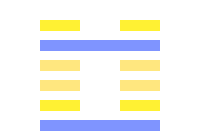
3.1.2.5.6 (3 > 4) - THE KUN HEXAGRAM
- 1. The first line, undivided, shows the difficulty (its subject has) in advancing. It will be advantageous for him to abide correct and firm; advantageous (also) to be made a feudal ruler.
- 2. The second line, divided, shows (its subject) distressed and obliged to return; (even) the horses of her chariot (also) seem to be retreating. (But) not by a spoiler (is she assailed), but by one who seeks her to be his wife. The young lady maintains her firm correctness, and declines a union. After ten years she will be united, and have children.
- 5. The fifth line, undivided, shows the difficulties in the way of (its subject's) dispensing the rich favours that might be expected from him. With firmness and correctness there will be good fortune in small things; (even) with them in great things there will be evil.
- 6. The topmost line, divided, shows (its subject) with the horses of his chariot obliged to retreat, and weeping tears of blood in streams.
3.1.2.5.6 (3 > 4) - Resolving difficulties
One prepares their shot well before the others are aware.
Bing DeepL Google Yandex3.1.2.5.6 (3 > 4) - Resolving difficulties
One prepares their shot well before the others are aware.
Bing DeepL Google Yandex3.1.2.5.6 (3 > 4) - T’un, la difficulté initiale
T’un et tchun : A. 1. Bourgeon, pousse ; 2. Croissance, activité ; 3. Grandir, avancer. — B. Difficultés, arrêté dans son avancement, échec.
- 1. Pour s’établir solidement, il faut se maintenir en fermeté et droiture. (Pour maintenir le royaume), il est bon de constituer des chefs féodaux. Bien qu’on ait des difficultés, la volonté doit toujours s’attacher au devoir. Si, bien qu’élevé, on condescend aux besoins des petits, on s’attachera fortement le peuple.
-
2. 2a. Tchun est comme arrêté par les difficultés, comme un cavalier dont le cheval veut reculer (ou : un cheval monté qui veut...).
2b. C’est comme la jeune fille qui veut épouser un brigand ravisseur, elle doit rester inébranlable et attendre (plutôt) dix ans. (Malgré cela), elle pourra alors se marier et être mère. (Il est ici question de difficultés.)
Un équipage solide, l’enfantement après dix ans indique le retour à la prospérité, à l’avancement. -
5. Dans le développement de la sève des bourgeons, si elle se répand modérément, la croissance sera heureuse ; si elle se répand trop, le croissance sera empêchée.
Il en est ainsi si elle se répand avant d’être suffisamment riche et forte.
Obstacle au développement : s’il est petit, l’issue peut être heureuse ; s’il est grand, fin malheureuse. - 6. L’avancement, arrêté comme un cheval monté qui recule, fait répandre des larmes amères et abondantes.
3.1.2.5.6 (3 > 4) - Remédier aux difficultés
On prépare son coup bien avant que les autres ne soient au courant.
Bing DeepL Google Yandex3.1.2.5.6 (3 > 4) - Megoldás
- 1. Példamutató ha valaki mások segítségére siet a nehézségek ellenére.
- 2. Megbízható kapcsolatokat kell kialakítania mielőtt mások elfogadnák.
- 5. Tudni akar mielőtt döntene.
- 6. Egyedül folytatja tovább mert mások biztosítékokat akarnak mielőtt támogatnák a fejlesztéseket. Tétotvázás helyett meg kell változtatnia szomszédságát hogy túlléphessen a nehézségeken.

3.3.5.6 (3 > 22) - THE KUN HEXAGRAM
- 3. The third line, divided, shows one following the deer without (the guidance of) the forester, and only finding himself in the midst of the forest. The superior man, acquainted with the secret risks, thinks it better to give up the chase. If he went forward, he would regret it.
- 5. The fifth line, undivided, shows the difficulties in the way of (its subject's) dispensing the rich favours that might be expected from him. With firmness and correctness there will be good fortune in small things; (even) with them in great things there will be evil.
- 6. The topmost line, divided, shows (its subject) with the horses of his chariot obliged to retreat, and weeping tears of blood in streams.
3.3.5.6 (3 > 22) - Being suspicious of everything
One does as if others had no chance of becoming trustworthy.
Bing DeepL Google Yandex3.3.5.6 (3 > 22) - Being suspicious of everything
One does as if others had no chance of becoming trustworthy.
Bing DeepL Google Yandex3.3.5.6 (3 > 22) - T’un, la difficulté initiale
T’un et tchun : A. 1. Bourgeon, pousse ; 2. Croissance, activité ; 3. Grandir, avancer. — B. Difficultés, arrêté dans son avancement, échec.
-
3. Lorsque le gibier poursuivi s’enfonce inopinément dans une forêt profonde, le sage aime mieux l’abandonner que de s’exposer au danger. S’il l’y poursuit, il aura lieu de s’en repentir.
Il sera réduit à l’extrémité. -
5. Dans le développement de la sève des bourgeons, si elle se répand modérément, la croissance sera heureuse ; si elle se répand trop, le croissance sera empêchée.
Il en est ainsi si elle se répand avant d’être suffisamment riche et forte.
Obstacle au développement : s’il est petit, l’issue peut être heureuse ; s’il est grand, fin malheureuse. - 6. L’avancement, arrêté comme un cheval monté qui recule, fait répandre des larmes amères et abondantes.
3.3.5.6 (3 > 22) - Se méfier de tout
On fait comme si les autres n'avaient aucune chance de devenir dignes de confiance.
Bing DeepL Google Yandex3.3.5.6 (3 > 22) - Megoldás
- 3. Magányosan halad ismeretlen terepen. Vezetőt kell keresnie vagy visszafordulnia.
- 5. Tudni akar mielőtt döntene.
- 6. Egyedül folytatja tovább mert mások biztosítékokat akarnak mielőtt támogatnák a fejlesztéseket. Tétotvázás helyett meg kell változtatnia szomszédságát hogy túlléphessen a nehézségeken.
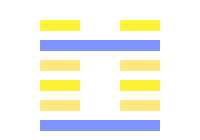
3.1.3.5.6 (3 > 52) - THE KUN HEXAGRAM
- 1. The first line, undivided, shows the difficulty (its subject has) in advancing. It will be advantageous for him to abide correct and firm; advantageous (also) to be made a feudal ruler.
- 3. The third line, divided, shows one following the deer without (the guidance of) the forester, and only finding himself in the midst of the forest. The superior man, acquainted with the secret risks, thinks it better to give up the chase. If he went forward, he would regret it.
- 5. The fifth line, undivided, shows the difficulties in the way of (its subject's) dispensing the rich favours that might be expected from him. With firmness and correctness there will be good fortune in small things; (even) with them in great things there will be evil.
- 6. The topmost line, divided, shows (its subject) with the horses of his chariot obliged to retreat, and weeping tears of blood in streams.
3.1.3.5.6 (3 > 52) - Revealing a conspiracy
One receives evidence that shows that they may have been betrayed.
Bing DeepL Google Yandex3.1.3.5.6 (3 > 52) - Revealing a conspiracy
One receives evidence that shows that they may have been betrayed.
Bing DeepL Google Yandex3.1.3.5.6 (3 > 52) - T’un, la difficulté initiale
T’un et tchun : A. 1. Bourgeon, pousse ; 2. Croissance, activité ; 3. Grandir, avancer. — B. Difficultés, arrêté dans son avancement, échec.
- 1. Pour s’établir solidement, il faut se maintenir en fermeté et droiture. (Pour maintenir le royaume), il est bon de constituer des chefs féodaux. Bien qu’on ait des difficultés, la volonté doit toujours s’attacher au devoir. Si, bien qu’élevé, on condescend aux besoins des petits, on s’attachera fortement le peuple.
-
3. Lorsque le gibier poursuivi s’enfonce inopinément dans une forêt profonde, le sage aime mieux l’abandonner que de s’exposer au danger. S’il l’y poursuit, il aura lieu de s’en repentir.
Il sera réduit à l’extrémité. -
5. Dans le développement de la sève des bourgeons, si elle se répand modérément, la croissance sera heureuse ; si elle se répand trop, le croissance sera empêchée.
Il en est ainsi si elle se répand avant d’être suffisamment riche et forte.
Obstacle au développement : s’il est petit, l’issue peut être heureuse ; s’il est grand, fin malheureuse. - 6. L’avancement, arrêté comme un cheval monté qui recule, fait répandre des larmes amères et abondantes.
3.1.3.5.6 (3 > 52) - Révéler un complot
On reçoit des éléments qui montrent que l'on a pu avoir été trahi.
Bing DeepL Google Yandex3.1.3.5.6 (3 > 52) - Megoldás
- 1. Példamutató ha valaki mások segítségére siet a nehézségek ellenére.
- 3. Magányosan halad ismeretlen terepen. Vezetőt kell keresnie vagy visszafordulnia.
- 5. Tudni akar mielőtt döntene.
- 6. Egyedül folytatja tovább mert mások biztosítékokat akarnak mielőtt támogatnák a fejlesztéseket. Tétotvázás helyett meg kell változtatnia szomszédságát hogy túlléphessen a nehézségeken.

3.2.3.5.6 (3 > 26) - THE KUN HEXAGRAM
- 2. The second line, divided, shows (its subject) distressed and obliged to return; (even) the horses of her chariot (also) seem to be retreating. (But) not by a spoiler (is she assailed), but by one who seeks her to be his wife. The young lady maintains her firm correctness, and declines a union. After ten years she will be united, and have children.
- 3. The third line, divided, shows one following the deer without (the guidance of) the forester, and only finding himself in the midst of the forest. The superior man, acquainted with the secret risks, thinks it better to give up the chase. If he went forward, he would regret it.
- 5. The fifth line, undivided, shows the difficulties in the way of (its subject's) dispensing the rich favours that might be expected from him. With firmness and correctness there will be good fortune in small things; (even) with them in great things there will be evil.
- 6. The topmost line, divided, shows (its subject) with the horses of his chariot obliged to retreat, and weeping tears of blood in streams.
3.2.3.5.6 (3 > 26) - Containing hesitations
One tempers others so as to prevent them from moving forward hesitantly.
Bing DeepL Google Yandex3.2.3.5.6 (3 > 26) - Containing hesitations
One tempers others so as to prevent them from moving forward hesitantly.
Bing DeepL Google Yandex3.2.3.5.6 (3 > 26) - T’un, la difficulté initiale
T’un et tchun : A. 1. Bourgeon, pousse ; 2. Croissance, activité ; 3. Grandir, avancer. — B. Difficultés, arrêté dans son avancement, échec.
-
2. 2a. Tchun est comme arrêté par les difficultés, comme un cavalier dont le cheval veut reculer (ou : un cheval monté qui veut...).
2b. C’est comme la jeune fille qui veut épouser un brigand ravisseur, elle doit rester inébranlable et attendre (plutôt) dix ans. (Malgré cela), elle pourra alors se marier et être mère. (Il est ici question de difficultés.)
Un équipage solide, l’enfantement après dix ans indique le retour à la prospérité, à l’avancement. -
3. Lorsque le gibier poursuivi s’enfonce inopinément dans une forêt profonde, le sage aime mieux l’abandonner que de s’exposer au danger. S’il l’y poursuit, il aura lieu de s’en repentir.
Il sera réduit à l’extrémité. -
5. Dans le développement de la sève des bourgeons, si elle se répand modérément, la croissance sera heureuse ; si elle se répand trop, le croissance sera empêchée.
Il en est ainsi si elle se répand avant d’être suffisamment riche et forte.
Obstacle au développement : s’il est petit, l’issue peut être heureuse ; s’il est grand, fin malheureuse. - 6. L’avancement, arrêté comme un cheval monté qui recule, fait répandre des larmes amères et abondantes.
3.2.3.5.6 (3 > 26) - Contenir les hésitations
On freine les autres pour les empêcher d'avancer en hésitant.
Bing DeepL Google Yandex3.2.3.5.6 (3 > 26) - Megoldás
- 2. Megbízható kapcsolatokat kell kialakítania mielőtt mások elfogadnák.
- 3. Magányosan halad ismeretlen terepen. Vezetőt kell keresnie vagy visszafordulnia.
- 5. Tudni akar mielőtt döntene.
- 6. Egyedül folytatja tovább mert mások biztosítékokat akarnak mielőtt támogatnák a fejlesztéseket. Tétotvázás helyett meg kell változtatnia szomszédságát hogy túlléphessen a nehézségeken.
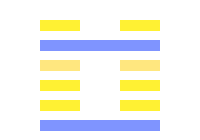
3.1.2.3.5.6 (3 > 18) - THE KUN HEXAGRAM
- 1. The first line, undivided, shows the difficulty (its subject has) in advancing. It will be advantageous for him to abide correct and firm; advantageous (also) to be made a feudal ruler.
- 2. The second line, divided, shows (its subject) distressed and obliged to return; (even) the horses of her chariot (also) seem to be retreating. (But) not by a spoiler (is she assailed), but by one who seeks her to be his wife. The young lady maintains her firm correctness, and declines a union. After ten years she will be united, and have children.
- 3. The third line, divided, shows one following the deer without (the guidance of) the forester, and only finding himself in the midst of the forest. The superior man, acquainted with the secret risks, thinks it better to give up the chase. If he went forward, he would regret it.
- 5. The fifth line, undivided, shows the difficulties in the way of (its subject's) dispensing the rich favours that might be expected from him. With firmness and correctness there will be good fortune in small things; (even) with them in great things there will be evil.
- 6. The topmost line, divided, shows (its subject) with the horses of his chariot obliged to retreat, and weeping tears of blood in streams.
3.1.2.3.5.6 (3 > 18) - Resolving difficulties
One believes oneself above others when they should highlight them.
Bing DeepL Google Yandex3.1.2.3.5.6 (3 > 18) - Resolving difficulties
One believes oneself above others when they should highlight them.
Bing DeepL Google Yandex3.1.2.3.5.6 (3 > 18) - T’un, la difficulté initiale
T’un et tchun : A. 1. Bourgeon, pousse ; 2. Croissance, activité ; 3. Grandir, avancer. — B. Difficultés, arrêté dans son avancement, échec.
- 1. Pour s’établir solidement, il faut se maintenir en fermeté et droiture. (Pour maintenir le royaume), il est bon de constituer des chefs féodaux. Bien qu’on ait des difficultés, la volonté doit toujours s’attacher au devoir. Si, bien qu’élevé, on condescend aux besoins des petits, on s’attachera fortement le peuple.
-
2. 2a. Tchun est comme arrêté par les difficultés, comme un cavalier dont le cheval veut reculer (ou : un cheval monté qui veut...).
2b. C’est comme la jeune fille qui veut épouser un brigand ravisseur, elle doit rester inébranlable et attendre (plutôt) dix ans. (Malgré cela), elle pourra alors se marier et être mère. (Il est ici question de difficultés.)
Un équipage solide, l’enfantement après dix ans indique le retour à la prospérité, à l’avancement. -
3. Lorsque le gibier poursuivi s’enfonce inopinément dans une forêt profonde, le sage aime mieux l’abandonner que de s’exposer au danger. S’il l’y poursuit, il aura lieu de s’en repentir.
Il sera réduit à l’extrémité. -
5. Dans le développement de la sève des bourgeons, si elle se répand modérément, la croissance sera heureuse ; si elle se répand trop, le croissance sera empêchée.
Il en est ainsi si elle se répand avant d’être suffisamment riche et forte.
Obstacle au développement : s’il est petit, l’issue peut être heureuse ; s’il est grand, fin malheureuse. - 6. L’avancement, arrêté comme un cheval monté qui recule, fait répandre des larmes amères et abondantes.
3.1.2.3.5.6 (3 > 18) - Remédier aux difficultés
On se croit au-dessus des autres alors qu'on devrait les mettre en valeur.
Bing DeepL Google Yandex3.1.2.3.5.6 (3 > 18) - Megoldás
- 1. Példamutató ha valaki mások segítségére siet a nehézségek ellenére.
- 2. Megbízható kapcsolatokat kell kialakítania mielőtt mások elfogadnák.
- 3. Magányosan halad ismeretlen terepen. Vezetőt kell keresnie vagy visszafordulnia.
- 5. Tudni akar mielőtt döntene.
- 6. Egyedül folytatja tovább mert mások biztosítékokat akarnak mielőtt támogatnák a fejlesztéseket. Tétotvázás helyett meg kell változtatnia szomszédságát hogy túlléphessen a nehézségeken.

3.4.5.6 (3 > 21) - THE KUN HEXAGRAM
- 4. The fourth line, divided, shows (its subject as a lady), the horses of whose chariot appear in retreat. She seeks, however, (the help of) him who seeks her to be his wife. Advance will be fortunate; all will turn out advantageously.
- 5. The fifth line, undivided, shows the difficulties in the way of (its subject's) dispensing the rich favours that might be expected from him. With firmness and correctness there will be good fortune in small things; (even) with them in great things there will be evil.
- 6. The topmost line, divided, shows (its subject) with the horses of his chariot obliged to retreat, and weeping tears of blood in streams.
3.4.5.6 (3 > 21) - Resolving difficulties
One makes reservations so that others remember what they have been told.
Bing DeepL Google Yandex3.4.5.6 (3 > 21) - Resolving difficulties
One makes reservations so that others remember what they have been told.
Bing DeepL Google Yandex3.4.5.6 (3 > 21) - T’un, la difficulté initiale
T’un et tchun : A. 1. Bourgeon, pousse ; 2. Croissance, activité ; 3. Grandir, avancer. — B. Difficultés, arrêté dans son avancement, échec.
-
4. Si elle est demandée en mariage selon les rites, qu’elle y aille et ce sera bien. Cela lui sera avantageux.
Il en est de même de l’équipage arrêté qui reprend sa course. -
5. Dans le développement de la sève des bourgeons, si elle se répand modérément, la croissance sera heureuse ; si elle se répand trop, le croissance sera empêchée.
Il en est ainsi si elle se répand avant d’être suffisamment riche et forte.
Obstacle au développement : s’il est petit, l’issue peut être heureuse ; s’il est grand, fin malheureuse. - 6. L’avancement, arrêté comme un cheval monté qui recule, fait répandre des larmes amères et abondantes.
3.4.5.6 (3 > 21) - Remédier aux difficultés
On fait des réserves pour que les autres se souviennent de ce qu'on leur a dit.
Bing DeepL Google Yandex3.4.5.6 (3 > 21) - Megoldás
- 4. Segítséget kap ha kivárja a sorát.
- 5. Tudni akar mielőtt döntene.
- 6. Egyedül folytatja tovább mert mások biztosítékokat akarnak mielőtt támogatnák a fejlesztéseket. Tétotvázás helyett meg kell változtatnia szomszédságát hogy túlléphessen a nehézségeken.

3.1.4.5.6 (3 > 35) - THE KUN HEXAGRAM
- 1. The first line, undivided, shows the difficulty (its subject has) in advancing. It will be advantageous for him to abide correct and firm; advantageous (also) to be made a feudal ruler.
- 4. The fourth line, divided, shows (its subject as a lady), the horses of whose chariot appear in retreat. She seeks, however, (the help of) him who seeks her to be his wife. Advance will be fortunate; all will turn out advantageously.
- 5. The fifth line, undivided, shows the difficulties in the way of (its subject's) dispensing the rich favours that might be expected from him. With firmness and correctness there will be good fortune in small things; (even) with them in great things there will be evil.
- 6. The topmost line, divided, shows (its subject) with the horses of his chariot obliged to retreat, and weeping tears of blood in streams.
3.1.4.5.6 (3 > 35) - Bypassing legislation
One enters a lawless area to be authorised to do what others do not want.
Bing DeepL Google Yandex3.1.4.5.6 (3 > 35) - Bypassing legislation
One enters a lawless area to be authorized to do what others do not want.
Bing DeepL Google Yandex3.1.4.5.6 (3 > 35) - T’un, la difficulté initiale
T’un et tchun : A. 1. Bourgeon, pousse ; 2. Croissance, activité ; 3. Grandir, avancer. — B. Difficultés, arrêté dans son avancement, échec.
- 1. Pour s’établir solidement, il faut se maintenir en fermeté et droiture. (Pour maintenir le royaume), il est bon de constituer des chefs féodaux. Bien qu’on ait des difficultés, la volonté doit toujours s’attacher au devoir. Si, bien qu’élevé, on condescend aux besoins des petits, on s’attachera fortement le peuple.
-
4. Si elle est demandée en mariage selon les rites, qu’elle y aille et ce sera bien. Cela lui sera avantageux.
Il en est de même de l’équipage arrêté qui reprend sa course. -
5. Dans le développement de la sève des bourgeons, si elle se répand modérément, la croissance sera heureuse ; si elle se répand trop, le croissance sera empêchée.
Il en est ainsi si elle se répand avant d’être suffisamment riche et forte.
Obstacle au développement : s’il est petit, l’issue peut être heureuse ; s’il est grand, fin malheureuse. - 6. L’avancement, arrêté comme un cheval monté qui recule, fait répandre des larmes amères et abondantes.
3.1.4.5.6 (3 > 35) - Contourner la législation
On entre dans une zone de non-droit pour être autorisé à faire ce que les autres ne veulent pas.
Bing DeepL Google Yandex3.1.4.5.6 (3 > 35) - Megoldás
- 1. Példamutató ha valaki mások segítségére siet a nehézségek ellenére.
- 4. Segítséget kap ha kivárja a sorát.
- 5. Tudni akar mielőtt döntene.
- 6. Egyedül folytatja tovább mert mások biztosítékokat akarnak mielőtt támogatnák a fejlesztéseket. Tétotvázás helyett meg kell változtatnia szomszédságát hogy túlléphessen a nehézségeken.

3.2.4.5.6 (3 > 38) - THE KUN HEXAGRAM
- 2. The second line, divided, shows (its subject) distressed and obliged to return; (even) the horses of her chariot (also) seem to be retreating. (But) not by a spoiler (is she assailed), but by one who seeks her to be his wife. The young lady maintains her firm correctness, and declines a union. After ten years she will be united, and have children.
- 4. The fourth line, divided, shows (its subject as a lady), the horses of whose chariot appear in retreat. She seeks, however, (the help of) him who seeks her to be his wife. Advance will be fortunate; all will turn out advantageously.
- 5. The fifth line, undivided, shows the difficulties in the way of (its subject's) dispensing the rich favours that might be expected from him. With firmness and correctness there will be good fortune in small things; (even) with them in great things there will be evil.
- 6. The topmost line, divided, shows (its subject) with the horses of his chariot obliged to retreat, and weeping tears of blood in streams.
3.2.4.5.6 (3 > 38) - Learning to avoid traps
One notices dividing lines that do not allow them to go where they want.
Bing DeepL Google Yandex3.2.4.5.6 (3 > 38) - Learning to avoid traps
One notices dividing lines that do not allow them to go where they want.
Bing DeepL Google Yandex3.2.4.5.6 (3 > 38) - T’un, la difficulté initiale
T’un et tchun : A. 1. Bourgeon, pousse ; 2. Croissance, activité ; 3. Grandir, avancer. — B. Difficultés, arrêté dans son avancement, échec.
-
2. 2a. Tchun est comme arrêté par les difficultés, comme un cavalier dont le cheval veut reculer (ou : un cheval monté qui veut...).
2b. C’est comme la jeune fille qui veut épouser un brigand ravisseur, elle doit rester inébranlable et attendre (plutôt) dix ans. (Malgré cela), elle pourra alors se marier et être mère. (Il est ici question de difficultés.)
Un équipage solide, l’enfantement après dix ans indique le retour à la prospérité, à l’avancement. -
4. Si elle est demandée en mariage selon les rites, qu’elle y aille et ce sera bien. Cela lui sera avantageux.
Il en est de même de l’équipage arrêté qui reprend sa course. -
5. Dans le développement de la sève des bourgeons, si elle se répand modérément, la croissance sera heureuse ; si elle se répand trop, le croissance sera empêchée.
Il en est ainsi si elle se répand avant d’être suffisamment riche et forte.
Obstacle au développement : s’il est petit, l’issue peut être heureuse ; s’il est grand, fin malheureuse. - 6. L’avancement, arrêté comme un cheval monté qui recule, fait répandre des larmes amères et abondantes.
3.2.4.5.6 (3 > 38) - Apprendre à éviter les pièges
On remarque des lignes séparatrices qui ne permettent pas d'aller où on veut.
Bing DeepL Google Yandex3.2.4.5.6 (3 > 38) - Megoldás
- 2. Megbízható kapcsolatokat kell kialakítania mielőtt mások elfogadnák.
- 4. Segítséget kap ha kivárja a sorát.
- 5. Tudni akar mielőtt döntene.
- 6. Egyedül folytatja tovább mert mások biztosítékokat akarnak mielőtt támogatnák a fejlesztéseket. Tétotvázás helyett meg kell változtatnia szomszédságát hogy túlléphessen a nehézségeken.
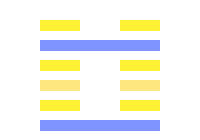
3.1.2.4.5.6 (3 > 64) - THE KUN HEXAGRAM
- 1. The first line, undivided, shows the difficulty (its subject has) in advancing. It will be advantageous for him to abide correct and firm; advantageous (also) to be made a feudal ruler.
- 2. The second line, divided, shows (its subject) distressed and obliged to return; (even) the horses of her chariot (also) seem to be retreating. (But) not by a spoiler (is she assailed), but by one who seeks her to be his wife. The young lady maintains her firm correctness, and declines a union. After ten years she will be united, and have children.
- 4. The fourth line, divided, shows (its subject as a lady), the horses of whose chariot appear in retreat. She seeks, however, (the help of) him who seeks her to be his wife. Advance will be fortunate; all will turn out advantageously.
- 5. The fifth line, undivided, shows the difficulties in the way of (its subject's) dispensing the rich favours that might be expected from him. With firmness and correctness there will be good fortune in small things; (even) with them in great things there will be evil.
- 6. The topmost line, divided, shows (its subject) with the horses of his chariot obliged to retreat, and weeping tears of blood in streams.
3.1.2.4.5.6 (3 > 64) - Resolving difficulties
One is regarded as being tender but they have some very clear-cut ideas in store.
Bing DeepL Google Yandex3.1.2.4.5.6 (3 > 64) - Resolving difficulties
One is regarded as being tender but they have some very clear-cut ideas in store.
Bing DeepL Google Yandex3.1.2.4.5.6 (3 > 64) - T’un, la difficulté initiale
T’un et tchun : A. 1. Bourgeon, pousse ; 2. Croissance, activité ; 3. Grandir, avancer. — B. Difficultés, arrêté dans son avancement, échec.
- 1. Pour s’établir solidement, il faut se maintenir en fermeté et droiture. (Pour maintenir le royaume), il est bon de constituer des chefs féodaux. Bien qu’on ait des difficultés, la volonté doit toujours s’attacher au devoir. Si, bien qu’élevé, on condescend aux besoins des petits, on s’attachera fortement le peuple.
-
2. 2a. Tchun est comme arrêté par les difficultés, comme un cavalier dont le cheval veut reculer (ou : un cheval monté qui veut...).
2b. C’est comme la jeune fille qui veut épouser un brigand ravisseur, elle doit rester inébranlable et attendre (plutôt) dix ans. (Malgré cela), elle pourra alors se marier et être mère. (Il est ici question de difficultés.)
Un équipage solide, l’enfantement après dix ans indique le retour à la prospérité, à l’avancement. -
4. Si elle est demandée en mariage selon les rites, qu’elle y aille et ce sera bien. Cela lui sera avantageux.
Il en est de même de l’équipage arrêté qui reprend sa course. -
5. Dans le développement de la sève des bourgeons, si elle se répand modérément, la croissance sera heureuse ; si elle se répand trop, le croissance sera empêchée.
Il en est ainsi si elle se répand avant d’être suffisamment riche et forte.
Obstacle au développement : s’il est petit, l’issue peut être heureuse ; s’il est grand, fin malheureuse. - 6. L’avancement, arrêté comme un cheval monté qui recule, fait répandre des larmes amères et abondantes.
3.1.2.4.5.6 (3 > 64) - Remédier aux difficultés
On passe pour être un tendre mais on a en réserve des idées bien tranchées.
Bing DeepL Google Yandex3.1.2.4.5.6 (3 > 64) - Megoldás
- 1. Példamutató ha valaki mások segítségére siet a nehézségek ellenére.
- 2. Megbízható kapcsolatokat kell kialakítania mielőtt mások elfogadnák.
- 4. Segítséget kap ha kivárja a sorát.
- 5. Tudni akar mielőtt döntene.
- 6. Egyedül folytatja tovább mert mások biztosítékokat akarnak mielőtt támogatnák a fejlesztéseket. Tétotvázás helyett meg kell változtatnia szomszédságát hogy túlléphessen a nehézségeken.

3.3.4.5.6 (3 > 30) - THE KUN HEXAGRAM
- 3. The third line, divided, shows one following the deer without (the guidance of) the forester, and only finding himself in the midst of the forest. The superior man, acquainted with the secret risks, thinks it better to give up the chase. If he went forward, he would regret it.
- 4. The fourth line, divided, shows (its subject as a lady), the horses of whose chariot appear in retreat. She seeks, however, (the help of) him who seeks her to be his wife. Advance will be fortunate; all will turn out advantageously.
- 5. The fifth line, undivided, shows the difficulties in the way of (its subject's) dispensing the rich favours that might be expected from him. With firmness and correctness there will be good fortune in small things; (even) with them in great things there will be evil.
- 6. The topmost line, divided, shows (its subject) with the horses of his chariot obliged to retreat, and weeping tears of blood in streams.
3.3.4.5.6 (3 > 30) - Resolving difficulties
One know the solution but others are not ready to accept it.
Bing DeepL Google Yandex3.3.4.5.6 (3 > 30) - Resolving difficulties
One know the solution but others are not ready to accept it.
Bing DeepL Google Yandex3.3.4.5.6 (3 > 30) - T’un, la difficulté initiale
T’un et tchun : A. 1. Bourgeon, pousse ; 2. Croissance, activité ; 3. Grandir, avancer. — B. Difficultés, arrêté dans son avancement, échec.
-
3. Lorsque le gibier poursuivi s’enfonce inopinément dans une forêt profonde, le sage aime mieux l’abandonner que de s’exposer au danger. S’il l’y poursuit, il aura lieu de s’en repentir.
Il sera réduit à l’extrémité. -
4. Si elle est demandée en mariage selon les rites, qu’elle y aille et ce sera bien. Cela lui sera avantageux.
Il en est de même de l’équipage arrêté qui reprend sa course. -
5. Dans le développement de la sève des bourgeons, si elle se répand modérément, la croissance sera heureuse ; si elle se répand trop, le croissance sera empêchée.
Il en est ainsi si elle se répand avant d’être suffisamment riche et forte.
Obstacle au développement : s’il est petit, l’issue peut être heureuse ; s’il est grand, fin malheureuse. - 6. L’avancement, arrêté comme un cheval monté qui recule, fait répandre des larmes amères et abondantes.
3.3.4.5.6 (3 > 30) - Remédier aux difficultés
On connait la solution mais les autres ne sont pas prêts à l'accepter.
Bing DeepL Google Yandex3.3.4.5.6 (3 > 30) - Megoldás
- 3. Magányosan halad ismeretlen terepen. Vezetőt kell keresnie vagy visszafordulnia.
- 4. Segítséget kap ha kivárja a sorát.
- 5. Tudni akar mielőtt döntene.
- 6. Egyedül folytatja tovább mert mások biztosítékokat akarnak mielőtt támogatnák a fejlesztéseket. Tétotvázás helyett meg kell változtatnia szomszédságát hogy túlléphessen a nehézségeken.
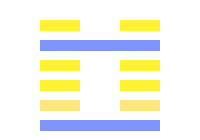
3.1.3.4.5.6 (3 > 56) - THE KUN HEXAGRAM
- 1. The first line, undivided, shows the difficulty (its subject has) in advancing. It will be advantageous for him to abide correct and firm; advantageous (also) to be made a feudal ruler.
- 3. The third line, divided, shows one following the deer without (the guidance of) the forester, and only finding himself in the midst of the forest. The superior man, acquainted with the secret risks, thinks it better to give up the chase. If he went forward, he would regret it.
- 4. The fourth line, divided, shows (its subject as a lady), the horses of whose chariot appear in retreat. She seeks, however, (the help of) him who seeks her to be his wife. Advance will be fortunate; all will turn out advantageously.
- 5. The fifth line, undivided, shows the difficulties in the way of (its subject's) dispensing the rich favours that might be expected from him. With firmness and correctness there will be good fortune in small things; (even) with them in great things there will be evil.
- 6. The topmost line, divided, shows (its subject) with the horses of his chariot obliged to retreat, and weeping tears of blood in streams.
3.1.3.4.5.6 (3 > 56) - Resolving difficulties
One knows well the temperament of the short-tempered so they say nothing.
Bing DeepL Google Yandex3.1.3.4.5.6 (3 > 56) - Resolving difficulties
One knows well the temperament of the short-tempered so they say nothing.
Bing DeepL Google Yandex3.1.3.4.5.6 (3 > 56) - T’un, la difficulté initiale
T’un et tchun : A. 1. Bourgeon, pousse ; 2. Croissance, activité ; 3. Grandir, avancer. — B. Difficultés, arrêté dans son avancement, échec.
- 1. Pour s’établir solidement, il faut se maintenir en fermeté et droiture. (Pour maintenir le royaume), il est bon de constituer des chefs féodaux. Bien qu’on ait des difficultés, la volonté doit toujours s’attacher au devoir. Si, bien qu’élevé, on condescend aux besoins des petits, on s’attachera fortement le peuple.
-
3. Lorsque le gibier poursuivi s’enfonce inopinément dans une forêt profonde, le sage aime mieux l’abandonner que de s’exposer au danger. S’il l’y poursuit, il aura lieu de s’en repentir.
Il sera réduit à l’extrémité. -
4. Si elle est demandée en mariage selon les rites, qu’elle y aille et ce sera bien. Cela lui sera avantageux.
Il en est de même de l’équipage arrêté qui reprend sa course. -
5. Dans le développement de la sève des bourgeons, si elle se répand modérément, la croissance sera heureuse ; si elle se répand trop, le croissance sera empêchée.
Il en est ainsi si elle se répand avant d’être suffisamment riche et forte.
Obstacle au développement : s’il est petit, l’issue peut être heureuse ; s’il est grand, fin malheureuse. - 6. L’avancement, arrêté comme un cheval monté qui recule, fait répandre des larmes amères et abondantes.
3.1.3.4.5.6 (3 > 56) - Remédier aux difficultés
On connait bien le tempérament des colériques alors on se tait.
Bing DeepL Google Yandex3.1.3.4.5.6 (3 > 56) - Megoldás
- 1. Példamutató ha valaki mások segítségére siet a nehézségek ellenére.
- 3. Magányosan halad ismeretlen terepen. Vezetőt kell keresnie vagy visszafordulnia.
- 4. Segítséget kap ha kivárja a sorát.
- 5. Tudni akar mielőtt döntene.
- 6. Egyedül folytatja tovább mert mások biztosítékokat akarnak mielőtt támogatnák a fejlesztéseket. Tétotvázás helyett meg kell változtatnia szomszédságát hogy túlléphessen a nehézségeken.

3.2.3.4.5.6 (3 > 14) - THE KUN HEXAGRAM
- 2. The second line, divided, shows (its subject) distressed and obliged to return; (even) the horses of her chariot (also) seem to be retreating. (But) not by a spoiler (is she assailed), but by one who seeks her to be his wife. The young lady maintains her firm correctness, and declines a union. After ten years she will be united, and have children.
- 3. The third line, divided, shows one following the deer without (the guidance of) the forester, and only finding himself in the midst of the forest. The superior man, acquainted with the secret risks, thinks it better to give up the chase. If he went forward, he would regret it.
- 4. The fourth line, divided, shows (its subject as a lady), the horses of whose chariot appear in retreat. She seeks, however, (the help of) him who seeks her to be his wife. Advance will be fortunate; all will turn out advantageously.
- 5. The fifth line, undivided, shows the difficulties in the way of (its subject's) dispensing the rich favours that might be expected from him. With firmness and correctness there will be good fortune in small things; (even) with them in great things there will be evil.
- 6. The topmost line, divided, shows (its subject) with the horses of his chariot obliged to retreat, and weeping tears of blood in streams.
3.2.3.4.5.6 (3 > 14) - Resolving difficulties
One spends time with those who could help them.
Bing DeepL Google Yandex3.2.3.4.5.6 (3 > 14) - Resolving difficulties
One spends time with those who could help them.
Bing DeepL Google Yandex3.2.3.4.5.6 (3 > 14) - T’un, la difficulté initiale
T’un et tchun : A. 1. Bourgeon, pousse ; 2. Croissance, activité ; 3. Grandir, avancer. — B. Difficultés, arrêté dans son avancement, échec.
-
2. 2a. Tchun est comme arrêté par les difficultés, comme un cavalier dont le cheval veut reculer (ou : un cheval monté qui veut...).
2b. C’est comme la jeune fille qui veut épouser un brigand ravisseur, elle doit rester inébranlable et attendre (plutôt) dix ans. (Malgré cela), elle pourra alors se marier et être mère. (Il est ici question de difficultés.)
Un équipage solide, l’enfantement après dix ans indique le retour à la prospérité, à l’avancement. -
3. Lorsque le gibier poursuivi s’enfonce inopinément dans une forêt profonde, le sage aime mieux l’abandonner que de s’exposer au danger. S’il l’y poursuit, il aura lieu de s’en repentir.
Il sera réduit à l’extrémité. -
4. Si elle est demandée en mariage selon les rites, qu’elle y aille et ce sera bien. Cela lui sera avantageux.
Il en est de même de l’équipage arrêté qui reprend sa course. -
5. Dans le développement de la sève des bourgeons, si elle se répand modérément, la croissance sera heureuse ; si elle se répand trop, le croissance sera empêchée.
Il en est ainsi si elle se répand avant d’être suffisamment riche et forte.
Obstacle au développement : s’il est petit, l’issue peut être heureuse ; s’il est grand, fin malheureuse. - 6. L’avancement, arrêté comme un cheval monté qui recule, fait répandre des larmes amères et abondantes.
3.2.3.4.5.6 (3 > 14) - Remédier aux difficultés
On passe du temps avec ceux qui pourraient nous aider.
Bing DeepL Google Yandex3.2.3.4.5.6 (3 > 14) - Megoldás
- 2. Megbízható kapcsolatokat kell kialakítania mielőtt mások elfogadnák.
- 3. Magányosan halad ismeretlen terepen. Vezetőt kell keresnie vagy visszafordulnia.
- 4. Segítséget kap ha kivárja a sorát.
- 5. Tudni akar mielőtt döntene.
- 6. Egyedül folytatja tovább mert mások biztosítékokat akarnak mielőtt támogatnák a fejlesztéseket. Tétotvázás helyett meg kell változtatnia szomszédságát hogy túlléphessen a nehézségeken.

3.1.2.3.4.5.6 (3 > 50) - THE KUN HEXAGRAM
- 1. The first line, undivided, shows the difficulty (its subject has) in advancing. It will be advantageous for him to abide correct and firm; advantageous (also) to be made a feudal ruler.
- 2. The second line, divided, shows (its subject) distressed and obliged to return; (even) the horses of her chariot (also) seem to be retreating. (But) not by a spoiler (is she assailed), but by one who seeks her to be his wife. The young lady maintains her firm correctness, and declines a union. After ten years she will be united, and have children.
- 3. The third line, divided, shows one following the deer without (the guidance of) the forester, and only finding himself in the midst of the forest. The superior man, acquainted with the secret risks, thinks it better to give up the chase. If he went forward, he would regret it.
- 4. The fourth line, divided, shows (its subject as a lady), the horses of whose chariot appear in retreat. She seeks, however, (the help of) him who seeks her to be his wife. Advance will be fortunate; all will turn out advantageously.
- 5. The fifth line, undivided, shows the difficulties in the way of (its subject's) dispensing the rich favours that might be expected from him. With firmness and correctness there will be good fortune in small things; (even) with them in great things there will be evil.
- 6. The topmost line, divided, shows (its subject) with the horses of his chariot obliged to retreat, and weeping tears of blood in streams.
3.1.2.3.4.5.6 (3 > 50) - Resolving difficulties
Others want one to stand beside them.
Bing DeepL Google Yandex3.1.2.3.4.5.6 (3 > 50) - Resolving difficulties
Others want one to be involved with them.
Bing DeepL Google Yandex3.1.2.3.4.5.6 (3 > 50) - T’un, la difficulté initiale
T’un et tchun : A. 1. Bourgeon, pousse ; 2. Croissance, activité ; 3. Grandir, avancer. — B. Difficultés, arrêté dans son avancement, échec.
- 1. Pour s’établir solidement, il faut se maintenir en fermeté et droiture. (Pour maintenir le royaume), il est bon de constituer des chefs féodaux. Bien qu’on ait des difficultés, la volonté doit toujours s’attacher au devoir. Si, bien qu’élevé, on condescend aux besoins des petits, on s’attachera fortement le peuple.
-
2. 2a. Tchun est comme arrêté par les difficultés, comme un cavalier dont le cheval veut reculer (ou : un cheval monté qui veut...).
2b. C’est comme la jeune fille qui veut épouser un brigand ravisseur, elle doit rester inébranlable et attendre (plutôt) dix ans. (Malgré cela), elle pourra alors se marier et être mère. (Il est ici question de difficultés.)
Un équipage solide, l’enfantement après dix ans indique le retour à la prospérité, à l’avancement. -
3. Lorsque le gibier poursuivi s’enfonce inopinément dans une forêt profonde, le sage aime mieux l’abandonner que de s’exposer au danger. S’il l’y poursuit, il aura lieu de s’en repentir.
Il sera réduit à l’extrémité. -
4. Si elle est demandée en mariage selon les rites, qu’elle y aille et ce sera bien. Cela lui sera avantageux.
Il en est de même de l’équipage arrêté qui reprend sa course. -
5. Dans le développement de la sève des bourgeons, si elle se répand modérément, la croissance sera heureuse ; si elle se répand trop, le croissance sera empêchée.
Il en est ainsi si elle se répand avant d’être suffisamment riche et forte.
Obstacle au développement : s’il est petit, l’issue peut être heureuse ; s’il est grand, fin malheureuse. - 6. L’avancement, arrêté comme un cheval monté qui recule, fait répandre des larmes amères et abondantes.
3.1.2.3.4.5.6 (3 > 50) - Remédier aux difficultés
Les autres veulent que l'on s'engage à leur côté.
Bing DeepL Google Yandex3.1.2.3.4.5.6 (3 > 50) - Megoldás
- 1. Példamutató ha valaki mások segítségére siet a nehézségek ellenére.
- 2. Megbízható kapcsolatokat kell kialakítania mielőtt mások elfogadnák.
- 3. Magányosan halad ismeretlen terepen. Vezetőt kell keresnie vagy visszafordulnia.
- 4. Segítséget kap ha kivárja a sorát.
- 5. Tudni akar mielőtt döntene.
- 6. Egyedül folytatja tovább mert mások biztosítékokat akarnak mielőtt támogatnák a fejlesztéseket. Tétotvázás helyett meg kell változtatnia szomszédságát hogy túlléphessen a nehézségeken.

